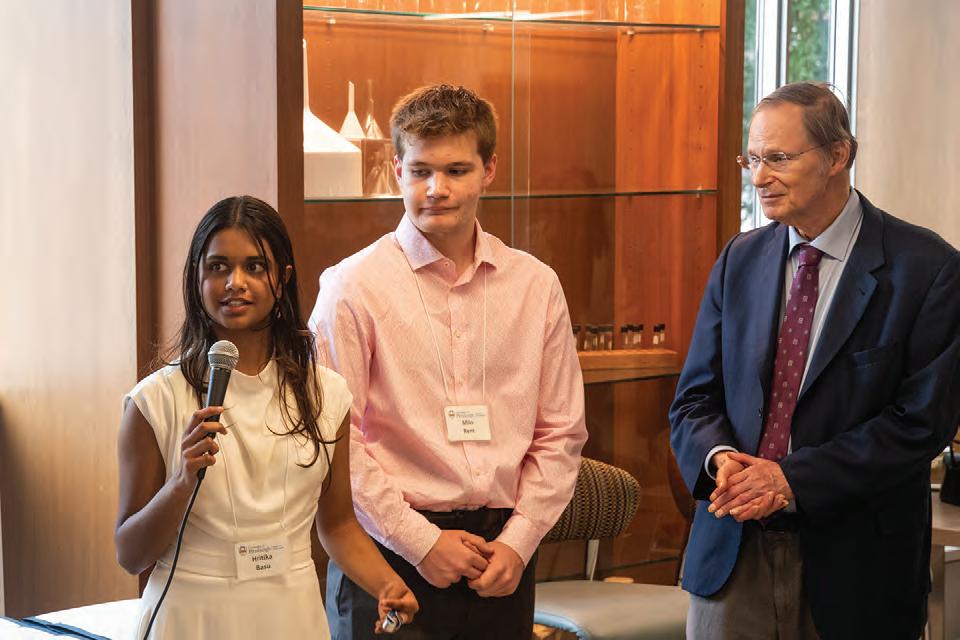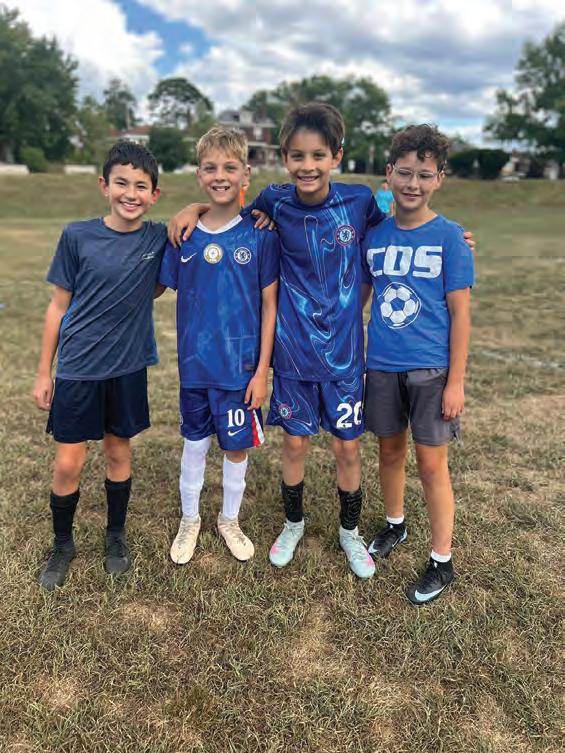







By David Rullo | Senior Sta Writer
Fallow since a June 2024 groundbreaking, the land housing the Tree of Life building will soon be busy with activity.
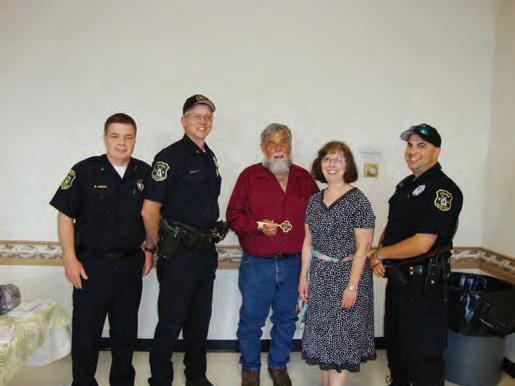


And while the official ceremony was thick with pomp and circumstance, Michael Bernstein said that, in its aftermath, the organization’s leaders thought there was a window of opportunity to reevaluate everything “before we truly put shovels in the ground.”
Bernstein is the board chair of the Tree of Life organization. He wanted to ensure the new building would be right, he said, not only for today but for decades into the future.
To do that, the Tree of Life examined three criteria, Bernstein said: cost, sustainability and how the new building will fit within the neighborhood.
Tree of Life, he explained, went back to Studio Libeskind and its principal architect, Daniel Libeskind, and began a new relationship with local architect IKM.
“We took a solid six months and reviewed a number of different options,” Bernstein said. “The long and the short of it is, we’re very excited to have a design that meets all the requirements that we are now pushing quite aggressively into construction drawings and permits.”
Besides a reimagined facade, the building will include a 300-seat state-of-the-art
sanctuary/theater that will provide space for both religious and cultural programming, and will feature the Tree of Life Congregation’s stained glass windows.
“There’s certainly going to be speaker, film and performance series,” Bernstein said. “We did not have that in the smaller sanctuary.”
Inspiration for the combined space, he said, comes from Sixth and I in Washington, D.C., a historic synagogue that now functions as both a synagogue and a space for cultural events.
While the classrooms and social hall will be about the same size as they were in the original design, Bernstein said the exhibition space is about 4,000 feet smaller than initially planned.
That diminution won’t come at the expense of the organization’s goal, he said.
“We worked with our exhibition team — we have an academic advisory committee that we really challenged. We asked, ‘Can you tell the story in a smaller space?’ and the feeling was, overwhelmingly, yes.”
A prominent feature of the previous design, the path of light, has been eliminated. Instead, there will be an entrance atrium connecting the new building with the existing building that will be functional space, something that was limited with the path of light.
By David Rullo | Senior Sta Writer
Resilience. Intervention. Partnership. According to Brette Steele, president of the Eradicate Hate Global Summit, those three themes will be explored at this year’s conference, Sept. 15-17 at the David Lawrence Convention Center.
Billed as a “unique, multidisciplinary forum to share ideas and build working relationships to drive the development and deployment of effective solutions to reduce hate-fueled violence,” the summit was created in 2021 by Laura Ellsworth and Mark Nordenberg in response to the Pittsburgh synagogue shooting.
“Day 1 is all about the resilience of targeted communities,” Steele said. “Day 2 is levels of intervention and recognizing that there are many different ways we can approach preventing violence … Day 3 is building impactful partnerships.”
Sept. 15, she said, will include a panel featuring eight survivors of different types of hate-fueled violence, “including, of course, the Tree of Life.”
All the panelists, Steele said, will talk of their experience with hate-fueled violence and how it has motivated them to prevent future acts of similar violence.
The day will also include various breakout sessions and an announcement from the Auschwitz Research Center on Hate Extremism and Radicalization.
“I’m not allowed to say much about it now,” Steele said, “but what I can say is that it is going to be taking place in the house of the former commandant of Auschwitz, located on the outer wall of Auschwitz, and it is an exciting announcement about the future use of that house.”
Day 2 will focus on intervention from several different aspects, Steele said, including the role of states, corporations and international partnerships in light of an apparent withdrawal by the federal government in that sphere.



By Emma Riva | Special to the Chronicle
Hand-woven quilts, teddy bears, base ball caps, votive candles and white p aper stars are just a few of the things Laura T. Levitt uses in her research. In her Sept. 14 presentation “Offerings of Grief, Offerings of Rage: Revisiting Tree of Life Synagogue and the George Floyd Square,” the Temple University-based writer and professor will be presenting her work on objects left behind after unspeakable tragedies.
But this is no jargon-laden academic talk. Though Levitt is the inaugural recipient of the Fine Fellowship — a $4000 grant from the University of Pittsburgh given to a scholar to work with the 10/27 Collection at the Heinz History Center — part of the fellowship’s goal is to create an accessible way for people to grapple with tragedy.
“I hope [attendees] come away feeling like researchers are approachable,” said Rachel Kranson, associate professor and director of Jewish Studies Pitt. “All of the scholars we select for this fellowship understand that engaging with the public — and in particular, being in conversation with the people of Pittsburgh — makes their work richer and more impactful.”
Kranson hopes the talk is the first of many expressions of “community-engaged scholarship” in the field. “While we had a number of thoughtful applications, Dr. Levitt’s previous research on objects of trauma as well as the work she was already undertaking at George Floyd Square convinced us that she was the right person to inaugurate the fellowship,” she said.
Maggie Feinstein, executive director of the 10.27 Healing Partnership at the Squirrel Hill
relevant today as I recognize the fatigue that so many of us are experiencing when it comes to seeing so much suffering and trauma in the world around us,” Feinstein said. “We are not sure we can keep up the energy of feeling the deep empathy and that is reasonable. On the other hand, to be a resilient community we cannot lead with apathy, we have to continue to try to find empathy for one another.”
Levitt’s interest in dealing with painful archival materials stems, in part, from a personal reckoning with how evidence is used in crimes. Her 2020 book “The Objects That Remain” tells her own story of having to provide physical evidence after she was raped in graduate school. The evidence was never formally processed.
“Even for those of us who experience violence in this culture and have evidence taken, it doesn’t mean that those cases will ever go to court,” she said. “I wrote about how engaging with those material objects is a way
of telling those stories, and in the process of
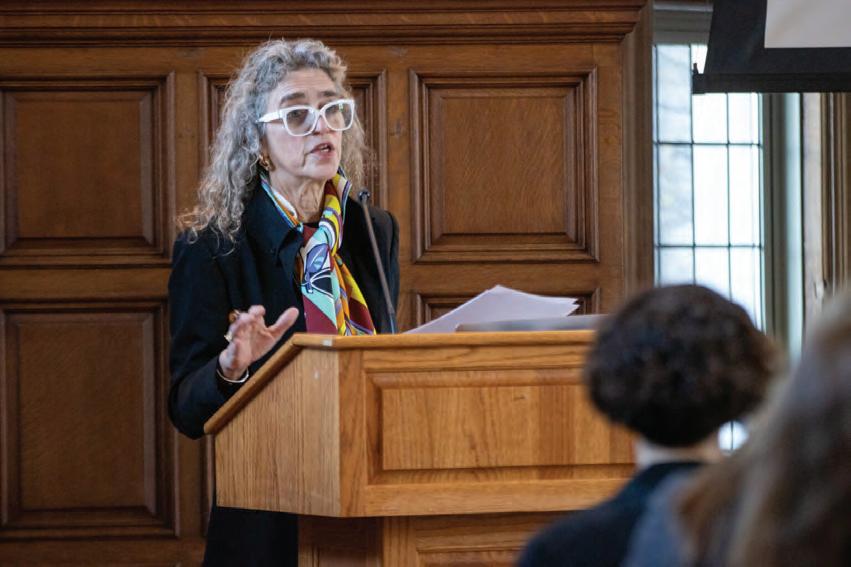
Levitt was already researching objects left behind at George Floyd Square in Minneapolis when she was accepted as a Fine Fellow.
“Part of the argument I’m making in the talk — that I hope to expand into a scholarly publication — is that these objects have a lot to teach us about people making connections across differences,” she said.
She was touched by the care taken both by local youth in Minneapolis and the Rauh Jewish History Program & Archives at the Heinz History Center in Pittsburgh. “I ask myself ‘What is the value of these objects people bring or send to these sites of violent enactments?’ I was really struck by the fact that there are people that tend to these objects, and that in Pittsburgh the 10/27 collection is a very careful attempt to gather the things left after the synagogue shooting.”
Materials from the Holocaust also inform Levitt’s understanding of offerings of grief.

SUBSCRIPTIONS
subscriptions@pittsburghjewishchronicle.org
412-687-1000, ext. 2
TO ADVERTISE advertising@pittsburghjewishchronicle.org 412-687-1000, ext. 1
EDITORIAL DEPARTMENT
Email: newsdesk@pittsburghjewishchronicle.org
BOARD OF TRUSTEES
Evan H. Stein, Chair
Evan Indianer, Vice Chair
Derek Smith, Treasurer
Gayle R. Kraut, Secretary
Gail Childs, Dan Droz, Malke Steinfeld Frank, Seth Glick, Tammy Hepps, Judith Kanal, Cátia Kossovsky, Charles Saul
GENERAL COUNSEL
Stuart R. Kaplan, Esq.
She pointed to the fact that a pair of shoes becomes a fine art object in the United States Holocaust Memorial Museum in Washington, D.C., but when viewers see it, they can identify with its ordinariness. Mundane objects like shoes and clothes ground the tragedy of history in an observable reality.
Those impacted by the Pittsburgh synagogue shooting continue to receive objects in the mail. Levitt argues that the offerings form a “civil expression of religion” that allows people to get in touch with complex emotions in a way that’s easier to access. Objects like those left at George Floyd Square and Tree of Life are physical — things you can touch and feel with your body, rather than emotions bottled up intangibly inside of you.
“We need a visceral way to express these emotions, not an abstract one,” she said. By making pilgrimages to both Tree of Life and George Floyd Square, Levitt hopes to highlight the inter-connectedness of racism and antisemitism — and the ways that each community has shown up for each other.
“It’s a way of saying this terrible thing happened and I want to be present there. It’s a way of recognizing the hurt of other people,” Levitt said.
“Part of what I found so moving is these were expressions of acknowledgments, listening and hearing.”
She hopes people come away from hearing her speak knowing “to value these smaller moments of human connection, of kindness, of care, of listening.”
Levitt’s talk, “Offerings of Grief, Offerings of Rage: Revisiting Tree of Life Synagogue and George Floyd Square,” is free with registration at JCC Squirrel Hill, 5738 Forbes Ave, running from 5-6:30 p.m. on Sept. 14. PJC
Emma Riva is a freelance writer living in Pittsburgh.
phone number: 412-687-1000 Subscriptions: 412-687-1000, ext. 2
Jim Busis, CEO and Publisher 412-228-4690 jbusis@pittsburghjewishchronicle.org
EDITORIAL
Toby Tabachnick, Editor 412-228-4577 ttabachnick@pittsburghjewishchronicle.org
Adam Reinherz, Senior Staff Writer 412-687-1000 areinherz@pittsburghjewishchronicle.org
David Rullo, Senior Staff Writer 412-687-1000 drullo@pittsburghjewishchronicle.org
ADVERTISING
Amy Weiss, Account Executive (412) 613-0697 aweiss@pittsburghjewishchronicle.org
PRODUCTION
Jeni Mann Tough
Production Manager Carl Weigel
Art/Production Coordinator
Subscriptions subscriptions@pittsburghjewishchronicle.org 412-687-1000, ext. 2
Published every Friday by the Pittsburgh Jewish Publication and Education Foundation 5915 Beacon St., 5th Floor Pittsburgh, PA 15217
Phone: 412-687-1000
POSTMASTER: Send address change to PITTSBURGH JEWISH CHRONICLE, 5915 BEACON ST., 5TH FLOOR PITTSBURGH, PA 15217 (PERIODICAL RATE POSTAGE PAID AT PITTSBURGH, PA AND AT ADDITIONAL MAILING OFFICES) USPS 582-740
Manuscripts, letters, documents and photographs sent to the Pittsburgh Jewish Chronicle become the property of this publication, which is not responsible for the return or loss of such items.
The Pittsburgh Jewish Chronicle does not endorse the goods or services advertised or covered in its pages and makes no representation to the kashrut of food products and services in said advertising or articles. The publisher is not liable for damages if, for any reason whatsoever, he fails to publish an advertisement or for any error in an advertisement. Acceptance of advertisers and of ad copy is subject to the publisher’s approval. The Pittsburgh Jewish Chronicle is not responsible if ads violate applicable laws and the advertiser will indemnify, hold harmless and defend the Pittsburgh Jewish Chronicle from all claims made by governmental agencies and consumers for any reason based on ads appearing in the Pittsburgh Jewish Chronicle

By Adam Reinherz | Senior Staff Writer
As the JFCS Squirrel Hill Food Pantry celebrates nearly a quarter century of helping ensure community members do not go hungry, its staff is also raising concerns.
Jordan Golin, president and CEO of JFCS, remembers the pantry’s 1998 beginnings.
Back then, he said, there was a “pretty widespread perception” that there was no poverty in the Jewish community.
Communal understanding changed, Golin continued, after the Jewish Healthcare Foundation conducted a study finding nearly 10% of Jewish families in the region were “living in poverty.”
Although those families met federal poverty guidelines, merely 4% received supplemental food services, according to the Rauh Jewish Archives at the Heinz History Center.
Along with its report demonstrating local food insecurity, JHF provided a three-year grant to establish the pantry and invited several organizations to help with planning, including JFCS, Hebrew Free Loan Association, Jewish Assistance on Aging, Rabbinical Council of Pittsburgh, Greater Pittsburgh Community Food Bank and Rainbow Kitchen.
In October 1998, the Kosher SuperPantry opened at Wightman School Community Center. Over the years, the location and name changed. The pantry moved to 5842 Forward Ave. in 2000, then relocated to 828 Hazelwood Ave. in 2010.
In 2007, in an effort to be more “straightforward,” the Kosher SuperPantry became the Squirrel Hill Food Pantry, then-director Aryeh Sherman told the Chronicle.
The institution continued growing, and “today we have a pantry that is a critical part not just of the Jewish community, but of the broader Pittsburgh community as well,” Golin said. In addition to helping kosher consumers, the pantry provides meals to individuals “who require emergency food when their local pantry isn’t open.”
According to city estimates, about 1 in 5 Pittsburgh residents “struggle to have healthy, adequate and culturally appropriate food.”
Within Allegheny County, 1 in 6 children “may not have enough food,” the Greater Pittsburgh Community Food Bank reported.
Data isn’t just numbers; it represents real people, explained Jesse Sharrard, the pantry’s director.
“We’re here as a resource for everybody,”

he said. Whether it’s older adults, “whose budgets on their fixed income don’t quite stretch enough,” people who are out of work or between jobs, or those who are facing hardships or homelessness, the pantry is committed to ensuring “somebody doesn’t have to skip out on meals to pay for other daily living expenses.”
Despite JFCS’ commitment to the cause, new pressures exist.
Since January 2025, the pantry has seen “significantly higher” requests for assistance, Sharrard said. Historically, 230-300 households visited the pantry each month. This year’s totals are closer to 430-450 households, “translating to somewhere upwards of 1,000 individuals per month,” he continued.
Along with an increased number of individuals served, demographics also
have changed. The organization is now seeing “larger households with more children,” he said.
Sharrard attributed the shift to growing costs and a job market impacted by “cuts to the federal workforce.”
Nearly 3 million people are employed by the federal government.
PBS reported in July that while there’s no “official figure” tracking job cuts, at least 75,000 federal employees had taken deferred resignation and thousands of probationary workers were terminated.
In August, Scott Kupor, director of the U.S. Office of Personnel Management, told Reuters the Trump administration would likely jettison about 300,000 workers this year, with just 80% leaving voluntarily.

The “trickle down” effect of federal policy changes is evident in Pittsburgh, Sharrard said. “In large part, we’re seeing people who have had some sort of disruption to their lives, whether in terms of costs, or in terms of income, or both.”
Golin said he’s staying focused on recent changes to the Supplemental Nutrition Assistance Program, a federally funded program ensuring low-income residents have purchasing power at grocery stores.
“SNAP is designed to help ensure that no one in America dies of hunger. And it does it through a very structured, very careful, way. It’s been evaluated non-stop. It has incredibly low rates of fraud,” he said.
The program’s origins date back more than 80 years; however, starting Sept. 1, in order to remain or become eligible for SNAP benefits, certain individuals will need to meet various requirements, including working, volunteering or participating in an education and training program for at least 20 hours a week, and reporting those experiences.
“It’s been a very successful program, but the changes to the program are going to result in millions of people losing their SNAP benefits,” Golin said.
He counted older adults, immigrants and single parents among those most likely affected.
“In addition to struggling to pay for everything else, in a time in which things are becoming more and more expensive, people are now going to struggle even more to put food on the table,” he said.
With Rosh Hashanah on the horizon, Golin said, the pantry is happy to report it is distributing locally sourced honey.
Traditional holiday practices, including dipping slices of apple in honey, signify the hope for a sweet new year.
Golin said it’s important to celebrate “sweetness” and recognize the “good that’s happening in our lives.”
Still, he hopes Pittsburghers approach the period with perspective.
“There’s a lot of stuff competing for our attention in this world, there’s so much happening on the federal level, there’s so much happening in people’s families,” he said. “My hope is that as people enjoy the sweetness, they also recognize that not everyone is as fortunate as us and that people are struggling.”
Once Pittsburghers come to that realization, they may arrive at a deeper understanding, he said.
“I believe that it’s our obligation to not only take care of our families, it’s also important for us to take care of our community.” PJC
Adam Reinherz can be reached at areinherz@pittsburghjewishchronicle.org.
By Deborah Weisberg | Special to the Chronicle
The closing of Denny Offstein Auto Sales & Service marks the end of an era for one of Butler’s best-known entrepreneurs and philanthropists.
Of fstein, 78, is retiring after a lifetime of buying and selling used vehicles, and performing good deeds in his community.
Although he founded his auto company in 1992, Offstein’s roots in the salvage business date back 104 years to when his grandfather settled in Butler to escape Jewish persecution in Poland.
“He bought a cart and two horses and sold rags and started a junkyard,” Offstein said. “My father kept the junkyard and bought a tow truck. I started towing and buying cars for my father’s auto wrecking company when I was 16.”
When he skipped college to start his own towing business, Offstein couldn’t have imagined that it would lead to a propensity for public service.
In the pre-dawn hours of a foggy morning in 1972, he was traveling in his truck on I-79 when he heard that a car had hit a bridge abutment. He sped to the scene, extricated the driver, who turned out to be a Pennsylvania state trooper, and extinguished a fire that was triggered by the wreck.
Offstein believes the rescue was divinely ordained. “I hardly ever talk about it,” he said, “but a spiritual being, with a halo, guided me to save the man’s life.”
That mitzvah, which earned commendations from American Legion Post 117 and Butler’s then-mayor Frank “Skip” Lefevre, would be the first of many acts of kindness Offstein has performed, including cleaning up a playground in the Island neighborhood where he lives and works.
“The playground was in deplorable condition in the 1990s,” he said. “A lot of bad things went on there. It was like grand central station for drug dealing.”
So Offstein came up with activities that would help restore the playground’s
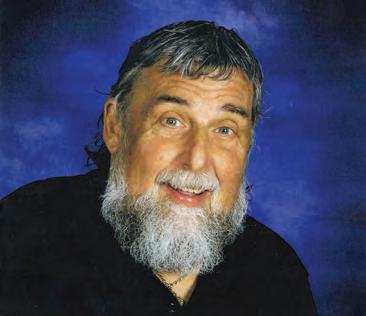
“Denny’s doing what we’re taught in the Torah. He’s so giving. He steps up to the plate.”
–MICHELE GRAY-SCHAFFER

family-friendly purpose. They included Camp Creation, an eight-week summer program of games, crafts and food provided by local churches and B’nai Abraham, Butler’s only synagogue, and Bicycle Rodeo, an annual bike giveaway and festival with prizes, free hotdogs and a petting zoo.
“I took out ads and spread the word and collected thousands of bikes from all over Butler County,” Offstein recalled. “I was inundated.”
R app’s Bicycle Center safety-checked every donated piece of equipment, he said. “We gave away more than 200 bikes a year. We made sure every kid 15 or younger got one.”
Offstein’s proudest achievement was spearheading a campaign, in 2013, to purchase and train K-9 officers for the Butler city police force.
“I had gotten to know the officers through my towing work, and I saw what they were up against dealing with crime in the playground,” said Offstein. “I’d give them license plate numbers of suspicious cars, and they made a lot of arrests.”
Offstein launched the K-9 fundraiser with a $10,000 interest-free loan, which triggered an outpouring of donations that eventually topped $100,000 — enough to buy two German shepherds and two K-9 equipped
asked (then) Pittsburgh police chief Nate Harper if our officers could train with his K-9 division. He said yes.”
Offstein once led a winter clothing drive that yielded 500 coats, plus mittens, gloves and scarves for those in need. “Some people don’t have a damn thing,” he said. “And I’ve always had more than I needed.”
Michele Gray-Schaffer, cantor and spiritual leader emerita of B’nai Abraham, has known Offstein for many years and said “his heart is always in the right place.
“Denny’s doing what we’re taught in the Torah. He’s so giving. He steps up to the plate.”
A former board member of B’nai Abraham, Offstein purchased carpeting and computers and helped with plantings around the shul in memory of Tree of Life congregants murdered in 2018, Gray-Schaffer said. “For the religious school there was nothing Denny wouldn’t do.”
Offstein said the decision to close his business was prompted by health issues, from which he is now recovering. Selling off the mountain of auto parts and other scrap amassed over several decades will take time.
Krill Recycling of Butler has removed 60,000 pounds so far with 50,000 pounds to go.
“I’m also getting rid of my tow trucks, except for the one that can follow me to the
although he is not preparing for that to happen anytime soon, since he is looking forward to an active retirement.
With 400 bikes still in storage, it may include one more Bicycle Rodeo, he said. Still, not working will be an adjustment, he admitted, since a nose-to-the-grindstone ethic is all he has ever known.
“I was a kid when my dad would hand me a five-gallon bucket and tell me to fill it with all the nuts, bolts and screws I could find. He’d pay me a nickel.”
“I was so young I could barely lift the bucket but when I brought it to him, he’d say, ‘Nuska full’ — not full enough. He needed it to be heaping. I had to give him extra.”
Offstein recalls also earning a nickel from his dad for every car he helped hook up to a tow truck. “I said to him one day, ‘Don’t you think I need a raise,’ and he gave me a dime.”
Widowed since 2001 and with no children, Offstein said he may now have time for a social life. “I’m a simple, quiet guy. I don’t go to bars. I don’t go out to eat,” he said. “But if I could meet a shayna maydel, I’d be in seventh heaven.” PJC
Deborah Weisberg is a freelance writer living in Pittsburgh.
By David Rullo | Senior Staff Writer
Jeremy Brokaw accepted a plea deal related to throwing antisemitic and racist literature from his vehicle on May 18 in Peters Township. He pled guilty to three out of 16 violations and received a reduced fine. Brokaw, of Zanesville, Ohio, appeared before a magistrate in Peters Township on Sept. 2 to accept the deal. He was charged under two statutes: one prohibiting the authorization of littering from a vehicle, and one prohibiting littering on “any highway, or upon any other public or private property without the consent of the owner thereof.”
On Aug. 28, Brokaw was found guilty in Pittsburgh under the same statutes of more than 160 charges. Fines related to the charges totaled more than $50,000. His lawyer, Joshua Smith, indicated he will appeal that verdict. Smith has a history of representing white supremacist individuals and groups. He previously represented Matthew Heimbach, Matthew Parrott and the Traditionalist Worker Party, a neo-Nazi group that helped put on the Unite the Right rally in Charlottesville, Virginia, in 2017. The attorney grew up in Pittsburgh in a Jewish family before changing his name.
The flyers thrown from Brokaw’s vehicle contained classic antisemitic conspiracy theories including, “Every single word of the Jewish Talmud is satanic” and “The Protocols
of the Learned Elders of Zion: The Jew’s Plan for World Domination.”
One potential witness, who spoke to the Chronicle on the condition of anonymity, was subpoenaed to appear in the Peters Township case. Because of the plea deal, they were not called to testify but said the agreement might be the best outcome.
“Now we have three charges that will 100% stick and never go away. He has a criminal record,” they said. “If they were found guilty it would have been appealed and if it was overturned, we would have nothing.”
Shawn Brokos, Jewish Federation of Greater Pittsburgh community security director, said she was surprised by the plea deal.
Brokaw, she said, made an intentional effort
to harass members of the Jewish community.
“To dismiss charges when citizens take the time to report them and come to court is disheartening, but there might be a reason for that I’m not privy to,” she said.
Brokos said she wanted to thank everyone who reported the incidents.
“We are grateful that the charges in Pittsburgh have not been downgraded or dismissed and that the case is ongoing,” she said.
B rokos urges anyone who witnesses anything suspicious to report it to law enforcement and the Federation at jewishpgh. org/form/incident-report. PJC
David Rullo can be reached at drullo@ pittsburghjewishchronicle.org.
By David Rullo | Senior Sta Writer
Matan Rieger was surprised when a federal judge ended the suspension of Students for Justice in Palestine’s University of Pittsburgh chapter last week.
The university suspended the group in March for six months, saying it had improperly attempted to influence a disciplinary committee while it was deliberating on whether an SJP-sponsored protest at Hillman Library violated university policies.
“This lawsuit alleged it was a free speech issue and that’s not what it was at all, at least to my understanding,” Rieger said. “It was a procedural issue with the university and their regulations about student organizations. I’m amazed that a federal judge can get involved and override the university’s interpretation of their policies.”
Rieger is an engineering student and president of Pitt’s Students Supporting Israel chapter. He said he’s afraid that the decision will have a lasting impact at the school and on how SJP operates.

“At this point they’ve shown that even if they get brought up on a conduct hearing and are suspended, ultimately Pitt can’t determine what happens, so they might as well try their luck again, especially since if a lawsuit is brought, it would likely end up before the same judge in the same court,” he said.
The judge’s decision, Rieger believes, may cause SJP to be less concerned about



the consequences of its actions. That is troubling, he opined, given that the group already has a tendency of doing things “beyond what organizations should do on campus. That’s what got them into the situation in the first place.”
Rieger said the federal decision could make Jewish students feel less safe — a concern heightened by SJP’s collaboration with organizations that are not recognized student


groups and its promotion of off-campus events on social media.
Despite the actions of SJP, Rieger said he has been impressed with how Pitt’s administration has handled the group.
“I’ve been very proud that it was my university that was actually able to stand up and suspend SJP,” he said. “That’s something that hasn’t been done at many universities.”
Rieger is also pleased that Pitt has created a working group on antisemitism and is anxious to see the fruits of its work.
Junior Sadie Rothaus is also concerned about the early lifting of SJP’s suspension.
“I kind of knew it was coming, but there’s always the ever present fear that reinstating a group like this will ignite another big wave of antisemitic violence and hate speech that’s going to target Jewish students,” she said.
Rothaus was quick to note that SJP hasn’t been a direct cause of violence against Jewish students on campus, but said it’s important for groups that use the shield of free speech to present factual information that doesn’t give rise to fear and discrimination.
Activities on and around Pitt’s campus have had a visceral effect on Rothaus.





Submit calendar items on the Chronicle’s website, pittsburghjewishchronicle.org. Submissions also will be included in print. Events will run in the print edition beginning one month prior to the date as space allows. The deadline for submissions is Friday, noon.
SATURDAY, SEPT. 13
Classrooms Without Borders presents “The Cure for Hate,” a film screening and Q&A with the documentary’s principal, Tony McAleer and director Peter Hutchinson. This program shares McAleer’s redemptive journey from a white supremacist to a repentant advocate for compassion who visits Auschwitz to confront history and his own Holocaust denialism. Free but advanced registration is required. 5 p.m. cwbpgh.org/event/thecure-for-hate-screening-cooper-siegel-librarary.
SUNDAY, SEPT. 14
Join Chabad of Squirrel Hill for a women’s mini retreat — a day of exciting workshops, crafts and words of inspiration to help prepare for the High Holidays. $54. 11 a.m. 1700 Beechwood Blvd. chabadpgh.com/retreat.
Classrooms Without Borders presents “The Cure for Hate,” a film screening and Q&A with the documentary’s principal, Tony McAleer and director Peter Hutchinson. This program shares McAleer’s redemptive journey from a white supremacist to a repentant advocate for compassion who visits Auschwitz to confront history and his own Holocaust denialism. Free but advanced registration is required. 2 p.m. wbpgh.org/event/thecure-for-hate-screening-schiappa-branch-library.
The University of Pittsburgh Jewish Studies Program and Rauh Jewish Archives present “O erings of Grief, O erings of Rage: Revisiting Tree of Life Synagogue and George Floyd Square.” Laura Levitt will explore how people individually and collectively grieve after mass, public tragedies. Her talk will illustrate how the memorial items at the George Floyd and Oct. 27 memorials, when viewed together, can teach us about racism and
antisemitism. 5 p.m. JCC Katz Auditorium, 5738 Forbes Ave. 1027healingpartnership.org/event/lauralevitt.
SUNDAYS, SEPT. 14-DEC. 28
Join Chabad of Squirrel Hill for its Men’s Tefillin Club Services and tefillin are followed by a delicious breakfast and engaging discussions on current events. 8:30 a.m. 1700 Beechwood Blvd. chabadpgh.com.
Join a lay-led online Parashah study group to discuss the weekly Torah portion. No Hebrew knowledge needed. The goal is to build community while deepening understanding of the text. 8:30 p.m. For more information, visit bethshalompgh.org/online-parashah.
MONDAY, SEPT. 15
Join Chabad of the South Hills for Ladies Pre-High Holiday Fashion Show, an elegant evening where Torah wisdom meets trending style. Refreshments served. 7 p.m. $10 in advance/$15 at the door. The Grey Parrot, 320 Castle Shannon Blvd. Chabadsh.com/ladies.
MONDAY, SEPT. 15–WEDNESDAY, SEPT. 17
The Eradicate Hate Global Summit brings together the world’s top minds to build relationships and solutions to reduce hate-fueled violence.
9 a.m., David L. Lawrence Convention Center, 1000 Fort Duquesne Blvd. eradicatehatesummit.org.
MONDAYS, SEPT. 15-29
Join the 10.27 Healing Partnership for Roll for Insight: Community-Building Role-Playing Games. Meet every other week to connect and grow with new friends through playing tabletop role-playing games designed to inspire emotional depth. They will use RPGs to explore the intersection of identity, emotional resiliency and games to fight isolation and disconnection, and to meet new people and form friendships. Free. No experience required. 16 and up. 5:30 p.m. Jewish Community Center, 5738 Forbes Ave. 1027healingpartnership.org/rpg-club.
MONDAYS, SEPT. 15-DEC. 29
Join Congregation Beth Shalom for a weekly Talmud

study. 9:15 a.m. For more information, visit bethshalompgh.org.
Join Temple Sinai for an evening of mahjong every Monday (except holidays). Whether you are just starting out or have years of experience, you are sure to enjoy the camaraderie and good times as you make new friends or cherish moments with long-term pals. All are welcome. Winners will be awarded Giant Eagle gift cards. All players should have their own mahjong cards. Contact Susan Cohen at susan_k_cohen@yahoo.com if you have questions. $5. templesinaipgh.org.
TUESDAY, SEPT. 16
Tree of Life Congregation is o ering classes to prepare for the upcoming High Holidays. In these sessions led by Rabbi Je rey Myers, attendees will view the film “Bruce Almighty,” followed by discussion questions. Free. 7 p.m. Rodef Shalom Congregation, 4905 Fifth Ave. treeoflifepgh.org.
WEDNESDAYS, SEPT. 17; OCT. 22
Join JFCS for Lunch & Learn: Supportive Parenting for Anxious Childhood Emotions (SPACE), a series designed to empower parents and guardians with skills, tools and confidence to support children with anxiety. All sessions are open to parents/guardians of school age children aged 7-18 still living in the home with a recognized anxiety disorder. Free. 1 p.m. Virtual through Zoom, link provided with registration. jfcspgh.org/event/ lunch-learn-supportive-parenting-for-anxious-child.
WEDNESDAYS, SEPT. 17-DEC. 31
Temple Sinai’s Rabbi Daniel Fellman presents a weekly Parshat/Torah portion class on site and online. Call 412-421-9715 for more information and the Zoom link.
Bring the parashah alive and make it personally relevant and meaningful with Rabbi Mark Goodman in this weekly Parashah Discussion: Life & Text. 12:15 p.m. For more information, visit bethshalompgh.org/life-text.
Join Chabad of the South Hills for Baby Loves Shabbat, music and movement for ages 0 to 3. Challah making and Shabbat songs. 3:45 p.m. 1701 Bower Hill Road. chabadsh.com.
THURSDAYS, SEPT. 18, NOV. 6, JAN. 15, MARCH 12, APRIL 30, JUNE 25
In the ever-evolving landscape of legal practice, understanding the interplay between faith and governance is crucial for lawyers. Join Rabbi
Danny Schi for an engaging CLE series that explores many intriguing questions. Individual classes: $45 with credit/$40 without credit. 8:30 a.m. Virtual. For a complete list of class dates and subjects visit, Jewishpgh.org/event.
SUNDAY, SEPT. 21
Join Rabbi Hazzan Je rey Myers for a cemetery service and visitation of your relatives and friends. 10 a.m. Tree of Life Memorial Park Cemetery, 2062 Reis Run Road, Franklin Park. treeoflifepgh.org.
Pliskover Association will be having cemetery visitation (Kaver Ovot) at the Pliskover Cemetery. Sara Stock Mayo will be available to assist with prayers at your relatives’ graves. 10 a.m. 27 Green Oak Drive. pliskover.com.
All kids are invited to a pre-Rosh Hashana Challah Bake, where they’ll make and braid their own challah to take home — plus enjoy a fun kitchen chemistry workshop with Mad Science. $10/child. 1 p.m. 1700 Beechwood Blvd. chabadpgh.com/kidscooking.
Join Chabad of the South Hills for a Shofar Sound Lab for kids. Shofar making demonstration, bake your own shofar-shaped honey cake. Kids dinner included. $12 before Sept. 17; $15 after Sept. 17. 4:15 p.m. 1700 Bower Hill Road. chabadsh.com/kids.
TUESDAY, SEPT. 23
Join CGI Squirrel Hill and CDS for shofar in the park with activities, treats and more. 4 p.m. CDS field (inside if raining), 6424 Forward Ave. chabadpgh.com/shofar.
FRIDAY, OCT. 10
Bring a vegan dish to Temple David on Erev Shabbat Chol HaMoed for the Ninth Annual Vegan Sukkot Potluck in the sukkah and social hall. Services follow at 7:30 p.m. followed by a plant-based oneg Shabbat. This year we are honored to welcome speaker Michael Gribov, head of movement building at Jewish Vegan Life. Questions? Need recipe ideas? Contact Stan Beck at stanb@ templedavid.org. Free. 6 p.m. 4415 Northern Pike.
SUNDAY, OCT. 19
The Pittsburgh Jewish Chronicle invites you to join the Chronicle Book Club on Zoom for its discussion of “Sons and Daughters” by Chaim Grade. 1 p.m. Email drullo@pittsburghjewish chronicle.org for registration link. PJC
The Pittsburgh Jewish Chronicle invites you to join the Chronicle Book Club for its Oct. 19 discussion of “Sons and Daughters,” by Chaim Grade.
From Amazon.com: “Originally serialized in the 1960s and 1970s in New York–based Yiddish newspapers, Chaim Grade’s ‘Sons and Daughters’ is a precious glimpse of a way of life that is no longer — the rich Yiddish culture of Poland and Lithuania that the Holocaust would eradicate. We meet the Katzenellenbogens in the tiny village of Morehdalye, in the 1930s, when gangs of Poles are beginning to boycott Jewish merchants and the modern, secular world is pressing in on the shtetl from all sides. It’s this clash, between the freethinking secular life and a life bound by religious duty — and the comforts offered by each — that stands at the center of ‘Sons and Daughters.’”
Your hosts
Toby Tabachnick, Chronicle editor
David Rullo, Chronicle senior staff writer
How it works
We will meet on Zoom on Sunday, Oct. 19, at 1 p.m.
What to do
Buy: “Sons and Daughters.” It is available at some area Barnes & Noble stores and
from online retailers, including Amazon and Barnes & Noble. It is also available through the Carnegie Library system.
Email: Contact us at drullo@pittsburghjewishchronicle.org, and write “Chronicle Book Club” in the subject line. We will send you a Zoom link for the discussion meeting. PJC
— Toby Tabachnick
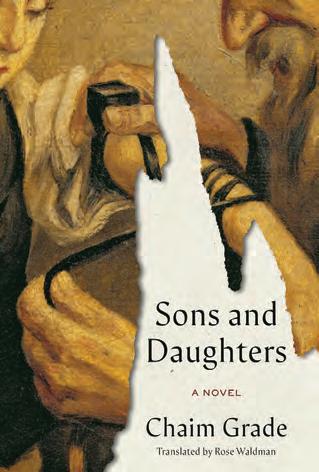

Pennsylvania Sens. Dave McCormick and John Fetterman recently sent letters to the heads of five Pennsylvania universities “expressing concern about the continued rise of antisemitism on college campuses in Pennsylvania and across the nation in the nearly two years since Hamas’ October 7, 2023, terror attack on Israel,” according to a news release from McCormick’s office.
The senators encouraged the presidents or chancellors of Pennsylvania State University, Temple University, University of Pittsburgh, University of Pennsylvania and Lehigh University to supply Jewish institutions on campus with the resources needed to help ensure “all students, regardless of their race, ethnicity, or shared ancestry are safe and able to fully participate in campus life.”
The letters read, in part: “As the 20252026 school year begins, we write to urge
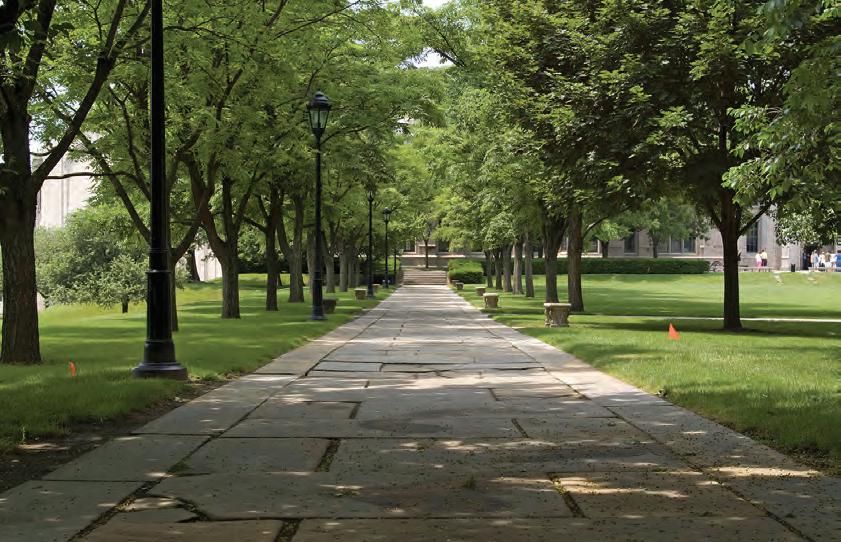
with a large Jewish student population, to commit to ensuring Jewish institutions on your campus are equipped to protect the students they serve, including by allocating
the Federation secured $43.4 million in 2025.
The Jewish Federation of Greater Pittsburgh has raised $14.2 million through its 2025 Community Campaign, the highest total in the organization’s history, the Federation announced in a news release.
The campaign closed at the end of the fiscal year on June 30.
Additionally, the Jewish Community Foundation secured more than $25 million in new funds, “bringing it to a new record of more than $390 million in assets under management,” according to Federation officials.
In total, “including supplemental giving from government and corporate partners,”
“This incredible result is a testament to the power of our community that cares,” said Debbie Resnick, 2025 Community Campaign chair.
The annual Community Campaign allows the Federation to fund security initiatives; assist the city’s three Jewish day schools; sustain campus organizations like Hillel JUC and Chabad; strengthen the Jewish Community Center of Greater Pittsburgh, Jewish Association on Aging, Jewish Family and Community Services, and The Branch; and respond to arising needs of Jewish communities locally and abroad, including in Israel. PJC
— Toby Tabachnick

ambitious, hardworking students to the Commonwealth. However, Pennsylvania campuses have been no exception to the alarming rise of antisemitic harassment and violence. Chabad houses have been vandalized, entrances to Hillel buildings have been targeted, and Jewish students have been assaulted. To protect the students and faculty they host, many Jewish institutions have been forced to cover the costs of additional security.
“Pennsylvania is home to some of the nation’s leading public and private universities. Your institution is spearheading cutting-edge research while attracting
“No student should feel like they must risk their safety to exercise their First Amendment rights to peacefully assemble and freely practice their religion. No campus institution should have to curtail its services to cover security expenses,” they continued. “We commend the recent steps taken at Pennsylvania universities to enforce codes of conduct, disband illegal encampments, and suspend student groups that have repeatedly targeted and harassed Jewish students.” PJC
— Toby Tabachnick
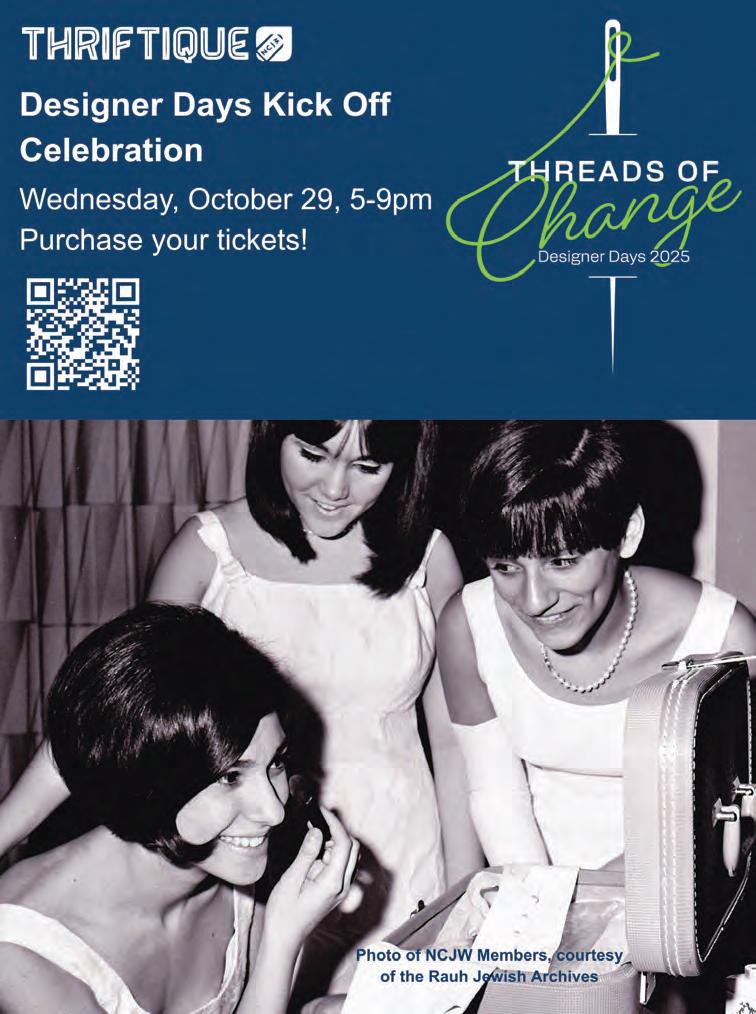
By Emanuel Fabian, Charlie Summers, Jeremy Sharon and Nava Freiberg | The Times of Israel
Six people were murdered Monday and 12 were wounded, six of them seriously, when a pair of Palestinian terrorists opened fire on vehicles and pedestrians in Jerusalem’s Ramot Junction.
The two gunmen, residents of the West Bank, arrived at the junction shortly after 10 a.m. — according to some reports, by car — and opened fire at people waiting at a bus stop as well at a bus that had just stopped there.
Police said that a soldier and a number of civilians who were present at the scene fired at the terrorists and killed them.
The military said the soldier was an off-duty squad commander in the military’s new Hasmonean Brigade, a unit for ultra-Orthodox troops. Magen David Adom said four of the victims were declared dead at the scene, while two others were rushed to hospital and later succumbed to their wounds.
At least six others were listed in serious condition, as well as two whose status was moderate and three who were lightly hurt, according to MDA.
The dead were named as Levi Yitzhak Pash, 57; Yaakov Pinto, 25; Yisrael Matzner, 28; Rabbi Yosef David, 43; Rabbi Mordechai Steintzag, 79; and Sarah Mendelson, 60.
The two terrorists were believed to have set out from the villages of Al-Qubeiba and Qatanna, just west of the junction and over the Green Line. The Israel Defense Forces said troops were encircling the villages, both located on the outskirts of Ramallah in the West Bank.
The military said troops were also dispatched to carry out scans for potential accomplices in the area alongside police.



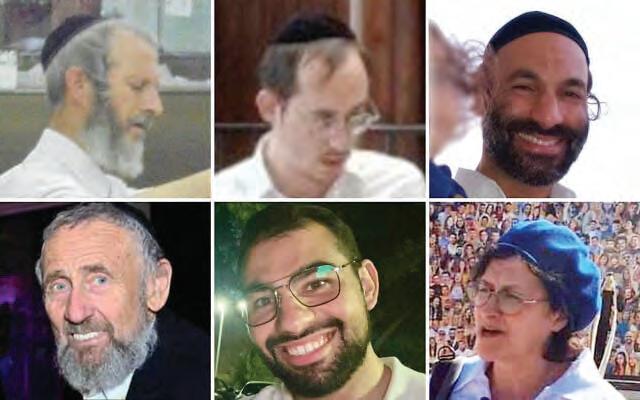
The attackers used makeshift “Carlo” submachine guns, according to images from the scene. The improvised gun, also known as a Carl Gustav, is commonly manufactured at illegal workshops in the West Bank and has been used in numerous Palestinian attacks in the past.
Police said they had recovered the weapons, as well as a knife and ammunition.
Law enforcement officials also said the Shin Bet security agency had arrested a resident of East Jerusalem suspected of smuggling the two gunmen into Jerusalem by car. The man has had previous run-ins with law enforcement for trying to






help Palestinians reside illegally in Israel, Kan news reported.
Prime Minister Benjamin Netanyahu later arrived at the scene, which he surveyed alongside National Security Minister Itamar Ben Gvir and MK Zvi Sukkot. The prime minister also entered the number 62 bus that had come under fire.
The premier offered his condolences to the families of the victims and wished a speedy recovery to the injured.
“A mighty war against terror is taking place on all fronts,” he told reporters at the scene. “We are now pursuing and encircling the villages where the terrorists
came from.”
Security forces have thwarted hundreds of attacks this year, “But unfortunately, not this morning,” he said.
“The fighting continues in the Gaza Strip,” Netanyahu said, adding that Israel “will destroy Hamas as we promised and free our hostages — all of our hostages.
“Sadly, the war also continues in Jerusalem and in Judea and Samaria, where we have acted with great force,” he said, using the biblical term for the West Bank.
Netanyahu vowed that such terror

and afterwards.
marks@marks-law.com • mhm@a-h.law 4927 William Flinn Highway Allison Park, Pennsylvania 15101 We make house calls!



Judge overturns Trump administration’s Harvard funding freeze tied to antisemitism allegations
A federal judge ruled last week that the Trump administration had illegally frozen more than $2.6 billion in federal funding to Harvard University over claims of antisemitism, JTA reported.
In her 84-page ruling, U.S. District Judge Allison Burroughs wrote that the Trump administration had used allegations of antisemitism at top U.S. universities as a “smokescreen” for advancing its political agenda.
“A review of the administrative record makes it difficult to conclude anything other than that Defendants used antisemitism as a smokescreen for a targeted, ideologically-motivated assault on this country’s premier universities,” Burroughs wrote.
The decision, which marks a significant legal victory for the Ivy League university, comes a month after the Trump administration found that the school had violated the civil rights of its Jewish and Israeli students in its response to alleged antisemitism on campus.
While the ruling is likely to be appealed by the federal government, Harvard and the Trump administration have also been negotiating a potential agreement that would reinstate its federal funding and end investigations into its conduct.
Iran downgrades ties with Australia over antisemitic arson attacks
Tehran downgraded diplomatic ties with Australia on Sept. 4, a week after Canberra
expelled its ambassador over accusations that the Islamic Republic was behind two antisemitic arson attacks in the cities of Sydney and Melbourne, JNS reported.
“According to diplomatic law and in response to Australia‘s action, the Islamic Republic has also reciprocally reduced the level of Australia’s diplomatic presence in Iran,” Reuters quoted Foreign Ministry spokesperson Esmaeil Baghaei as announcing, noting that Canberra’s ambassador had left Iran.
Australian Prime Minister Anthony Albanese said at a press conference last week that operations at his country’s embassy in Tehran had been suspended and that all Australian diplomats were safe in a third country.
The antisemitic attacks “were extraordinary and dangerous acts of aggression orchestrated by a foreign nation on Australian soil,” Albanese said. “They have sought to harm and terrorize Jewish Australians and sow hatred and division.”
Canberra’s decision to expel the Iranian ambassador, its first such move since World War II, was the latest example of a Western government accusing Iran of carrying out hostile covert activities on foreign soil.
United to resume flights to Tel Aviv from Chicago and DC in November
United Airlines announced that it will resume service to Tel Aviv from Chicago and Washington, D.C., in November, expanding its service to Israel beyond the New York area for the first time in two years, JNS reported.
The Chicago-based carrier said it will operate four weekly non-stop flights to Ben-Gurion
Sept. 15, 1891 — Writer Ben-Gavriel is born
Journalist-novelist Moshe Yaacov
International Airport from Chicago’s O’Hare International Airport starting on Nov. 1, and three weekly flights from Washington’s Dulles International Airport on Nov. 2, matching the frequency on those routes before they were suspended on Oct. 7, 2023.
The decision cements United’s position as the U.S. carrier with the most flights to Israel, a title it long held before the Hamas-led attack on the northwestern Negev, when it connected Ben-Gurion Airport with four American cities led by Newark and including Chicago, Washington, D.C., and San Francisco.
United resumed twice daily flights between its Newark hub and Tel Aviv in July.
The additional flights are expected to further reduce airfares this winter between the U.S. and Israel which have remained stubbornly high over the last two years due to heavy demand far outweighing the reduced supply.
USHMM says $2.5 million grant will help it focus on ‘religious dimensions’ of Holocaust
A $2.5 million grant from the Lilly Endowment will help the U.S. Holocaust Memorial Museum focus on “the religious dimensions of the Holocaust,” according to Lisa Leff, who directs the Washington museum’s advanced Holocaust studies center, JNS reported.
The new grant, which comes three years after receiving a similar value from the foundation, will also “strengthen our engagement with faith-based institutions and thought leaders on these critical issues,” Leff stated on Wednesday.
The museum stated that it plans to create “an endowed fund to help facilitate and expand programming that seeks to foster
greater understanding among the public, clergy, scholars and other religious thought leaders about the relationship between the Holocaust and faith-based traditions.”
Argentine police recover looted painting that was spotted in Nazi’s daughter’s real estate ad
After multiple failed attempts, Argentine police have recovered a painting that the Nazis looted from a Dutch Jewish art dealer during the Holocaust, JTA reported.
Dutch journalists first spotted the painting, “Portrait of a Lady” by Giuseppe Ghislandi, last month in an ad for a property being sold by a daughter of Friedrich Kadgien, a Nazi finance official who fled to Argentina after World War II. But when police entered the home to locate the work, one of more than 1,000 looted from the holdings of Jacques Goodstikker, it had been removed from the wall.
The police placed Patricia Kadgien on house arrest while searching for the painting. And last week, they announced that the family’s lawyer had handed over the painting to authorities.
“It’s in good condition for its age, since it dates from 1710,” an art historian, Ariel Bassano, said at a press conference where the painting was displayed, according to the newspaper La Capital Mar del Plata. “Its value could be around $50,000.”
The newspaper reported that authorities had found other paintings in the process of looking for “Portrait of a Lady” and are evaluating whether any others were looted during the Holocaust. PJC
— Compiled by Toby Tabachnick


Items are provided by the Center for Israel Education (israeled.org), where you can find more details.
Sept. 12, 2009 — Israeli film wins Golden Lion
An Israeli film wins the Golden Lion at the Venice International Film Festival for the first time. Samuel Maoz’s “Lebanon” follows a tank brigade in the First Lebanon War. It does not win the Ophir for best Israeli picture.
Sept. 13, 1984 — Peres becomes premier
Shimon Peres becomes Israel’s eighth prime minister, leading a national unity govern ment of his Alignment, Likud and six other parties. Peres agrees to yield power to Likud’s Yitzhak Shamir after two years.

p Palmach leaders including Yitzhak Rabin and Yigal Allon join David Ben-Gurion on a tour of the Negev during the War of Independence.
Ben-Gavriel is born in Vienna, Austria.
An Austrian soldier in Jerusalem in 1917, he fights for the British in World War II, then shifts from newspapers to novels and short stories.
Sept. 16, 1977 — Dayan meets with Egyptian official
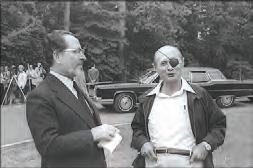
In talks kept secret even from the United States, Israeli Foreign Minister Moshe Dayan meets in Morocco with Egyptian Deputy Prime Minister Hassan Tuhami to assess each side’s willingness to negotiate toward peace.
Sept. 14, 1948 — Palmach is integrated Into
After a meeting with Palmach leaders, Prime Minister David Ben-Gurion announces that the elite strike force is being dismantled as an independent unit and, like militias, being integrated into the Israel Defense Forces.
Sept. 17, 1948 — Lehi assassinates U.N. envoy
Count Folke Bernadotte, a Swedish mediator who negotiated a one-month Arab-Israeli cease-fire in June, is assassinated by Lehi (the Stern Gang) over his plan for a permanent peace with an international Jerusalem.
Sept. 18, 1918 — Swimmer Judith Deutsch is born Champion swimmer Judith Deutsch is born in Vienna, Austria. She joins fellow Austrian swimmers Ruth Langer and Lucie Goldner in refusing to go to the 1936 Olympics in Berlin and later makes aliyah. PJC


“The big gain we got by having a smaller footprint was we actually opened up green space,” Bernstein said. “So, on the Wilkins Avenue side, outside of the social hall, there is now going to be a beautiful green lawn.”
The lawn will be available for additional programming, he said, something that is important to the organization as it envisions the site being used by the neighborhood.
“We’d like for people to stop and get a coffee while on a walk, sit outside, things like that,” Bernstein said.
The memorial design continues on the Shady Avenue side of the building. The entrance of the new building will be closer to where the old entrance was, and closer to the memorial.
The Tree of Life organization has already raised more than $46 million, which Bernstein said covers the capital requirements for the building. It continues to work toward a $60 million goal, down from $75 million of the original design. The additional funds, he said, will be used for the museum costs and the memorial design.
“We’re moving forward now because we can cover the cost of the building and then the balance is for operating costs and to give us some runway for the first few years,” Bernstein explained.
He hopes that construction will begin by the end of the year or the first quarter of 2026, for what he estimates will be an

18-month project.
“Our goal is to have the congregation hold High Holiday services in 2027 and then open the museum in early 2028,” Bernstein said.
Those passing the site will begin seeing physical changes by mid to late October, including a new wrap on the building and an enclosure where the memorial will be located.
The new building will house and support the work of the Tree of Life organization, which is centered on four pillars:
• Memorialization, to remember “the lives taken on Oct. 27, who they were and make sure everyone remembers what happened on that day was a tragedy for not just the Jewish community or Pittsburgh, but America,” Bernstein said.
• Education, including the Holocaust Center, which is a program of the Tree of Life with its own advisory board, and the LIGHT Education Initiative, now in 35 schools and continuing to grow.
• Jewish life and culture, consisting of the congregation and bringing Jewish life “back to the corner of Shady and Wilkins,” Bernstein said, including programming for Jews and non-Jews alike.
• A platform for national discussions, featuring programming like the traveling exhibition “Lessons from the Tree of Life: Lighting the Path Forward.”
The announcement of the new design is only part of an eventful period for the Tree of Life.
The organization's LIGHT Education
Initiative is co-sponsoring the Sept. 15 student summit at the Eradicate Hate Global Summit, featuring 36 schools and nearly 340 students.
Its traveling exhibit opens at the Museum of Jewish Heritage in New York on Oct. 5. A week later, on Oct. 12, the organization will host an event in New York with Yair Rosenberg from The Atlantic and Amy Spitalnick from the Jewish Council on Public Affairs. Spitalnick serves on the Tree of Life’s academic advisory committee. The two will discuss contemporary antisemitism and the challenges facing the Jewish community.
In Pittsburgh, on Oct. 19, another Tree of Life academic advisory committee member, Pamela Nadell, will appear at Carnegie Mellon University with The New York Times’ Bret Stephens.
Nadell’s new book, “Antisemitism, An American Tradition,” is scheduled to be published on Oct. 14.
And while Bernstein hopes the public can appreciate the programming the Tree of Life is creating, he also understands the perception that nothing has happened for almost seven years at the site of the worst antisemitic attack in American history. He hopes the community understands the need to be purposeful and exact.
“I’d rather measure three times before we hammer than rush forward,” he said. “Ten years from now, no one will remember if we took an extra six months, but they’ll 100% know if it’s overbuilt and unsustained.” PJC
David Rullo can be reached at drullo@ pittsburghjewishchronicle.org.
Included in the second day’s agenda is the conversation “Fighting hate with humanity,” featuring Lonnie Ali and Daniel Lubetzky. Ali was the fourth wife of boxer Muhammad Ali and a Muslim; Lubetzky is a Jewish Mexican American entrepreneur who was featured on the show “Shark Tank.”
David Goldman, founder and chairman of Fellowships at Auschwitz for the Study of Professional Ethics, will discuss how various professions contributed to the conditions that led to the Holocaust.
Day 3 opens with remarks from keynote speaker Irwin Cotler, the former minister of justice and attorney general of Canada, the inaugural Canadian special envoy for combatting antisemitism, and a Nobel Peace Prize nominee.
“Not in Our Town” executive producer Patrice O’Neill will also speak on the final day. The filmmaker produced the documentary “Repairing the World: Stories from the Tree of Life,” for her PBS series.
Concurrent with the start of the Eradicate Hate Global Summit is the Student Summit, now in its third year, hosting more than 340 students from 36 schools in the region.
The Student Summit has grown each year. Its initial offering included 14 schools; last year, 29 schools participated.
“Each year all of the schools from the previous year register,” Steele said. “We’re very excited about how it’s grown over time.”
To the casual observer, the Eradicate Hate Global Summit might seem like a once-ayear event that convenes top experts each September and then vanishes until the following year. But that’s not the case.
The organization’s working groups, now in their third year, are an example of the type of ongoing effort that occurs between each summit.
This year, working groups will meet on all three days of the summit, providing updates on what they’ve done between conventions.
There are now approximately 14 groups, and some have already produced results.
“We had a working group on building capacity of mental health practitioners to prevent occupation field violence,” Steele said. “They produced the firstever continuing education course for the American Psychological Association on preventing hate-fueled violence. That will be going live in November.”
Another working group will unveil at this year’s summit a toolkit for judges on how to manage violent extremism in the courtroom “when people are using their trials as a platform to further espouse their violent beliefs and call for violence,” Steele explained.
Still another working group will take a

deep dive into the 764 movement, a decentralized, international, online sextortion network that targets girls and is ideologically aligned with the terror network the Order of Nine Angels.
Over time, some of the working groups have completed their work; others continue for multiple years with a new set of concrete deliverables, Ellsworth said.
The work of the summit, Steele said,
continues each year.
“We are here doing the work the Global Summit will continue, as will our year-round programming,” she said.
More information about the Eradicate Hate Global Summit, its speakers and agenda can be found at eradicatehatesummit.org. PJC
David Rullo can be reached at drullo@ pittsburghjewishchronicle.org.
Reinstatement:
Continued from page 5
“I remember walking out of the Cathedral of Learning and there was a bunch of shouting and a big protest,” she said. “There were people with signs and flags in support of Palestine. I heard chanting and the speeches as I was crossing the street and just froze in my tracks as unbothered students rushed past me. I don’t remember what was said, but it was something despicable about Jews and Israel.”
Rothaus said she was shocked that
Continued from page 8
attacks would not deter Israel. “They only increase our determination to complete our missions, in Judea and Samaria too — everywhere,” he asserted.
Ben Gvir talked up his controversial policy of putting as many licensed guns as possible in the hands of civilians in recent years to boost security on the streets. “Weapons save lives,” he argued.
Both men also praised the ultra-Or thodox soldier who returned fire at the terrorists.
Dashcam footage showed the moments of the deadly shooting attack.
As shots rang out and amid sounds of screams, people could be seen scrambling to safety between vehicles.
A taxi driver was also seen exiting his vehicle and then calmly helping his passenger, an elderly woman, get out of the back seat, even as a bullet appeared to fly over his head and shatter the windshield of a bus just behind him. The two then moved out of view unharmed.
something like that could happen in the heart of Pitt’s campus.
Reinstating SJP opens the possibility to similar protests and more encampments, like Pitt experienced in 2024, she said.
That is something she doesn’t want to experience again, she said, especially since it forced her to reconsider showing outward signs of her Jewishness.
“I wear my Star of David every day and I remember my dad had a conversation with me about it,” she said. “I was going back and forth about taking it off, but then I realized that it would be the worst thing I could do. But I did try and avoid the encampments. I didn’t
want to inadvertently put myself at risk.”
While Rothaus is concerned about SJP’s reinstatement she’s also pragmatic about the right to protest.
“I know that the Students for Justice in Palestine’s core identity is not to threaten Jews,” she said. “I think it’s honorable to protest for justice on behalf of struggling people, but when that rhetoric leads to antisemitism, it’s incredibly hard to see the positive in people’s intentions.”
Students aren’t the only ones disheartened by the decision to reinstate SJP early.
Daniel Marcus, executive director and
CEO of the Hillel Jewish University Center, said he was “deeply disappointed” by the judge’s decision.
SJP has proven to be problematic for Jewish students, Marcus said, and has made them feel less safe.
Hillel JUC, though, is there for support, he said.
“We will continue to ensure the safety and security of every Jewish student and work closely with our partners at the university to do so,” he said. PJC
David Rullo can be reached at drullo@ pittsburghjewishchronicle.org.

Malka Cohen, who was on the number 62 bus when terrorists opened fire, recounted the harrowing moments of the attack.
“I was on the bus. The bus was packed,” Cohen told Channel 12. “The moment [the driver] opened the door … terrorists came. It was terrible. I was by the back door, I fell on everyone and escaped. I saved myself.”
She said she hid behind another nearby vehicle until the shooting stopped and the terrorists were neutralized.
“There was gunfire there beyond anything imaginable. I can’t believe I’m standing here. Indescribable gunfire,” she said.
Hamas praised the deadly attack, calling it a “heroic operation.”
“We affirm that this operation is a natural
response to the occupation’s crimes and war of extermination it is waging against our people,” the terror group said in a statement.
Hamas did not take responsibility for the attack, but called on West Bank Palestinians to “escalate the confrontation with the occupation and its settlers.”
Netanyahu had been set to attend a scheduled hearing to testify in his criminal
trial on Monday morning, but his lawyers told the court he would not be able to attend due to the terror attack. His attorney Noa Milstein told the court that “several severe security incidents at several scenes with fatalities” required Netanyahu to “participate in a series of consultations, security updates, [and] make urgent decisions.”
Netanyahu later held a situational assessment with the heads of the security establishment, the Prime Minister’s Office said in a statement.
Ben Gvir also conducted a situational assessment with deputy police commissioner Avshalom Peled and Jerusalem District commander Amir Arzani, police said.
Police blocked Route 1 through the Arazim Tunnel to eastbound traffic, law enforcement added.
The last major terror attack in Jerusalem was in November 2023, when two Palestinian gunmen killed four people and injured five near the Givat Shaul neighborhood at the main entrance to the city.
There have also been previous terror attacks in the Ramot Junction area. On Feb. 10, 2023, Hussein Qaraqa, an Israeli citizen and resident of the East Jerusalem neighborhood of Issawiya, rammed his car into a group of people standing at a bus stop near Ramot Junction. Six-yearold Yaakov Yisrael Paley and 20-yearold Alter Shlomo Lederman were killed on the spot, and Paley’s older brother, Asher Menahem Paley, 8, was critically hurt and died of his wounds the following day. PJC


Sept. 1 marked the 86th anniversary of Nazi Germany’s invasion of Poland, the start of World War II and the subsequent Holocaust. This somber anniversary was also marked by breaking news that the International Association of Genocide Scholars passed a resolution declaring Israel is committing a genocide in Gaza.
As a member of the association since 2013, I had been raising concerns about this deeply biased and inaccurate resolution for weeks. When it was first proposed to the IAGS membership in late July, I immediately connected with a number of fellow IAGS members who shared my concerns about the resolution and its incorrect assessment of Israel’s conduct in Gaza.
Among them was the biased so-called “expert” sources cited to support these erroneous claims. They included deeply questionable organizations and individuals, including Amnesty International (which rewrote the international definition of genocide to support its claims against Israel) and Francesca Albanese, the U.N. special rapporteur on the occupied Palestinian territories, whom the U.S. State Department condemned in June 2025 for “unabashed antisemitism, expressed support for terrorism, and open contempt for the United States, Israel, and the West.”
Rather than include thoroughly researched sources from experts in warfare, like retired Maj. John Spencer, the chair of urban warfare studies at the Modern War Institute at West Point, the sources selected for inclusion reinforced the biased, anti-Israel agenda of its authors.
Also of note, no original research from the IAGS membership was cited, which is unusual given the high stakes and international attention on this issue. Perhaps that is because one of the only pieces of research done by IAGS members on this subject is my peer-reviewed policy brief from December 2023 about the genocidal intent and actions of Hamas.
targeting Hamas terrorists. This is mind-boggling, given that Israel is setting new, vigorous standards of urban warfare that will hopefully change such engagement for the better by reducing civilian casualties.
The IAGS resolution also conveniently ignores the publicly stated aims of the Israeli government, which include
Israel is also actively preventing the genocide that Hamas has openly stated they would attempt again and again, if given the chance, to annihilate Israel and all the world’s Jews.
The IAGS, an association dedicated to research and teaching about genocide with a membership composed of scholars, activists and artists, presents a distorted analysis of the Israel-Hamas war. Its resolution purports to critically examine the defensive war Israel is waging against Hamas, a genocidal terrorist organization, and mislabels it genocide. Acting in self-defense by engaging in a war against an existential threat is not the same as “intent to destroy, in whole or in part” the Palestinian people living in Gaza.
Every civilian death in this war is a tragedy, but the data cited in the IAGS resolution not only fails to differentiate between civilians and combatants, but also relies entirely on Hamasproduced statistics. Using reports from a singular biased source is not just academically lazy; it recklessly distorts the data.
The resolution also ignores Israel’s unprecedented measures to avoid civilian casualties, often giving up the strategic advantage while
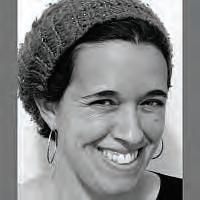
On Sept. 1, the first day of school for millions of Israeli children, I said goodbye to my two remaining high schoolers, wishing them luck as I went to meet a friend for a coffee date before work. I drove through the neighborhood, passing kids
in white shirts waiting at bus stops alongside their relieved parents. My heart grew big as I thought of crisp notebooks and freshly sharpened pencils, symbolic of the new chapters that our kids will begin writing today. Sept. 1 is a day of wide-eyed anticipation and tightlipped courage.
In an attempt to capture the unique spirit of this day, upon arriving at the coffee shop, I dug deep into the wells of my own courage and boldly decided to order something new off the menu. They were advertising boba drinks, which I had never tried before.

Imagine being told that you’re human. That’s what happened to two Israelis at a Coldplay concert in London.
Frontman Chris Martin invited two women who turned out to be Israeli on
stage — and when he discovered that, instead of simply celebrating the moment, he announced: “I’m very grateful that you’re here as humans … Although it’s controversial, maybe, I also want to welcome people in the audience from Palestine.”
Read that again. Israelis had to be introduced to the crowd as human beings. As if that were in doubt. As if their humanity needed a disclaimer.
Imagine this with any other group: Would Martin ever pull Indians from the
disarming Hamas, ensuring that terrorists do not govern Gaza again and returning the 48 remaining hostages in order to heal the survivors and properly bury those who were murdered. These aims are not genocidal.
Israel is also actively preventing the genocide that Hamas has openly stated they would attempt again and again, if given the chance, to annihilate Israel and all the world’s Jews.
Unfortunately, rather than seizing an opportunity for nuanced analysis of a very difficult and complicated war, the resolution does real harm by leaning into misinformation and disinformation campaigns and recklessly bandying the term “genocide” to describe the war in Gaza.
Rather than advance scholarly discourse on a gravely important topic, the political leanings and prejudices of the IAGS leadership mean they have turned away from the mission of the association — to “further research and teaching about
The topic of boba had come up in a few conversations over the summer. Boba is a highly divisive food that people either love, hate, or love to hate. My friend loves it — the texture provides a flavorful chew to her fruity drinks. My husband and kids are not fans. They swear it is the devil disguised as something edible and they warned me that the bobas might sneak up through my straw and try to kill me.
I appreciated their concern for my wellbeing, as I’m always cautioning my kids. I want to protect them from making mistakes — to
audience and say, “They’re human — and let’s also welcome Pakistanis”? Even with a brutal war raging, has anyone ever felt the need to affirm the humanity of Russians or Ukrainians from a stage?
The very thought is absurd. And insulting. Because the humanity of those groups is taken for granted. As it should be.
But when it comes to Israelis, suddenly it is “controversial” to state the obvious.
This is the glaring double standard. Russia invades Ukraine, yet Russians aren’t
the nature, causes, and consequences of genocide.” Instead, they offer fodder to the people who will read this resolution and leverage it to justify hurting Jews.
I fought this resolution and lost. Out of an estimated 500 members, 108 voted to pass this resolution (per IAGS, for a resolution to pass, it requires a 2/3 majority from a quorum of at least 20% plus one of all paid-up IAGS members). I tried to advocate for transparency, but the leadership refused to disclose who authored this resolution. I was promised a forum for scholarly debate and discussion, but no town hall was held.
The headlines covering the results that IAGS actively reposted on its now-deleted X account presented the false perception of an overwhelming majority vote. There was none. Of the approximately 500 members, only 129 voted. Those who oppose this heinous, libelous resolution were silenced.
Twelve years ago, I was excited and proud to join the IAGS community. I thought I had found my people. Today, I am saddened by what it has become. And anyone who considers themselves a genocide scholar should be embarrassed by this resolution. I know I am. PJC
Sara E. Brown is the director of the American Jewish Committee office in San Diego. She holds the first Ph.D. in comparative genocide studies from the Strassler Center for Holocaust and Genocide Studies at Clark University. She was also a director of Chhange, a Holocaust, human rights and genocide education nonprofit. This story was originally published on the Forward. To get the Forward’s free email newsletters delivered to your inbox, go to forward. com/newsletters.
spare them unnecessary pain, embarrassment. I often tell them that they should bring a sweatshirt because it’s colder than they think out there. I implore them never to be photographed wearing socks with sandals, because, though this has bewilderingly been an acceptable fad in this country for decades, it is bound to end sometime, and they will one day be haunted by this fashion faux pas. I beg them not to wait until the last minute to start their summer
demonized globally the way Israelis are. No one feels the need to “balance” every mention of Russians with Ukrainians. And let’s be honest: How many of the people chanting against Israel on Western streets have even met an Israeli? Very few. They know Israelis only as caricatures on a protest sign or villains in a social media feed. They’ve never shared a meal with one, studied with one, or worked alongside
Last week, the Chronicle asked its readers in an online poll the following question:
“Should Pittsburgh be a ‘sanctuary city’?” Of the 332 people who responded, 48% said yes; 45% said no; and 7% said they weren’t sure. Comments were submitted by 79 people. A few follow.
Our shared values of chesed , tzedek and tikkun olam require us as a community to take care of each other. We once needed sanctuary and many died because it was not offered.
I have so much ambivalence about this question. I have deep compassion for folks who are fleeing persecution in their home countries. We have been those people in our history. But Pittsburgh is having a difficult time with its very own homeless and foodless population. Walk the streets of downtown and even Forbes and Murray in Squirrel Hill and the problem is before our eyes. That feels like the city’s financial priority.
We should follow the law. Period.
There is no more Jewish value than welcoming the refugee.
Kislowicz:
Continued from page 12
math packet, because math is the worst, and it will make them cry harder in August than it would’ve in June. No one k nows why. Probably something to do with how the y-axis relates to atmospheric pressure.
I tell them these things even though I know they won’t listen. My living room is littered with sweatshirts left behind and math packets that lie blank as September inches closer.
But that’s OK, because I have come to understand that sometimes kids have to make their own mistakes. The lessons I learned through my poor fashion choices and math procrastination cannot be passed down from generation to generation like a recipe for chocolate chip cookies. My kids have to earn their stripes and their scars the hard way, by making their own decisions, good, bad and y-axis related.
And as hard as it may be to watch them make mistakes in real time, my role is not
Lass:
Continued from page 12
one. And yet, they feel free to brand Israelis uniquely suspect, uniquely controversial, uniquely in need of being “humanized.”
That isn’t solidarity. That’s ignorance weaponized into hate.
If I were to give Chris Martin the benefit of doubt, I’d say that he probably thought he was being diplomatic, but what he said ended up
It is important for the federal government to be able to enforce its borders and immigration law.
There is no evidence that ICE is only targeting true criminals, but is instead
grabbing the hard-working friends and neighbors who have established themselves and their families in our community and are following immigration law, working through the process in order to become legal residents.
People who have flaunted the law should have no sanctuary anywhere. They need to leave our country.
Absolutely! The federal Department of Justice may have declared Pittsburgh no longer a sanctuary city last month, but that has no effect on how we run our city. We have many immigrants here, and we hold them close and safe. Pittsburgh has been a sanctuary city for a long time, and as everyone here knows, we don’t take change easily.
I don’t want to give sanctuary to any antisemites or anti-Zionists, or terrorists of any kind, so I want all immigrants to be vetted properly before offering them any legal protections to stay in this country.
Every city should be a sanctuary city. This administration has been going after
My
kids
have to earn their stripes and their scars the hard way, by making their own decisions, good, bad and y-axis related.
to save them, it is simply to stand back and support them as they make their way in the world — to encourage good decision making and, when that fails, to refrain from saying I told them so. Even when I totally told them so.
Which leads me back to the boba. Boba is made up of something called tapioca pearls, which sound awesome. I like pearls. And I like tapioca, which, until now, I had only experienced in pudding form. So I threw caution to the atmospheric pressure, and I ordered a boba.
My courage was betrayed the instant that those bobas passed through my tight
reinforcing the ideas that: Israelis’ humanity is up for debate; and they can only be spoken of together in the context of Palestinians.
That’s why his words felt clumsy, even unthinkable. It’s a symptom of the environment where Israeli existence itself is politicized, and musicians or public figures feel they need to “justify” or balance every mention of Israelis with Palestinians.
This is not inclusivity. This is erasure. Israelis are not an abstract “side.” They are
lips. It turns out that the magical sounding tapioca pearls are merely a misnomer for giant squishy death bubbles that try to choke you while you’re drinking
I had been a fool not to heed the warnings of my loved ones. I confessed on the family WhatsApp: “I tried boba. It was a terrible mistake.”
I braced myself for the inevitable I told you so. But it didn’t come.
“Did you choke??” they asked.
“Multiple times,” I replied.
“So glad you survived!” they said. I guess they have come to understand
individuals: Mizrahi, Ashkenazi, Ethiopian, Indian, Druze, Arab. Religious and secular. Progressive and conservative. Real people, flattened into political symbols. When saying Israelis are human becomes “brave,” the problem isn’t with Israelis — it’s with a world that has normalized their demonization. No other people is treated this way. No other nation is singled out like this. No other group has to earn the right to be called human.
immigrants without regard for economic benefit, or participation in the legal system. They are not making us safer, or better off. They must be stopped.
Absolutely not. We have seen what has happened in other “sanctuary cities” and it doesn’t have to happen here.
Pittsburgh is an immigrant city. People from all over came here worked hard and they, and their children and the city thrived. We should keep this heritage alive.
Are immigration system reforms necessary? Of course. But that doesn’t change the basic question of if the rule of law should be followed. Immigrants coming to our city legally — yes; illegally — no.
We were all strangers in a strange land. PJC
— Compiled by Toby
Tabachnick
Chronicle weekly poll question: Will the new year, 5786, be better for the Jews than 5785? Go to pittsburghjewishchronicle. org to respond. PJC
that sometimes moms need to make their own mistakes.
On Sept. 1, and every day before and after, we send up a multitude of prayers that we have given our kids the tools that they need to be good, successful humans. We urge them to be kind to the new kid, to write down their homework, to have fun, and to pay attention. And sometimes they do. But often they don’t. Because sometimes we want to eat cookies from our no-fail, tried-and-true recipe. But on occasion, we want boba; we want to be brave and bold, to try new things, even when it makes our wide eyes water, as we cough and sputter, prompting our coffee date to wonder if we are making good choices.
So as the new year approaches, I urge you all to get out there, be courageous and daring. Bake cookies and eat pudding! Try the boba, if you must. I promise not to say I told you so. Even though I totally told you so. PJC
Kally Rubin-Kislowicz grew up in Pittsburgh, and made aliyah from Cleveland to Efrat in 2016. This article first appeared on The Times of Israel.
Israelis don’t need a reminder that they’re human — and no one else should either. PJC
Paushali Lass is an intercultural educator, writer and international speaker of Indian origin, based in Germany. With a deep connection to Israel, her work bridges Jewish and Christian communities, as well as different cultures, with a focus on education and faith-based initiatives. This article first appeared on The Times of Israel.
We invite you to submit letters for publication. Letters must include name, address and daytime phone number; addresses and phone numbers will not be published. Letters may not exceed 500 words and may be edited for length and clarity; they cannot be returned. Send letters to:letters@pittsburghjewishchronicle.org or Pittsburgh Jewish Chronicle, 5915 Beacon St., 5th Floor, Pittsburgh, PA 15217 We regret that owing to the volume of correspondence, we cannot reply to every letter.
tart than sweet.
By Jessica Grann | Special to the Chronicle
Ithink it’s safe to say we’re about ready to dive headfirst into apple season.
I can get so wrapped up thinking about apple cake and apple pie that I often forget how beautiful old-fashioned baked apples can be. They remind me of my great-grandmother, who always seemed to have an appropriate pie or dessert ready at any time and during any season.
These baked apples are not as sweet as other desserts, which why I like to make them. You can use green or red apples of any variety that you would use for a pie — just keep in mind that some are more
Each apple gets baked with a few table spoons of a brown sugar and oat topping. This is a very light topping that will spill out onto the plate once they apples are cut; it’s not as dense as a topping made with flour and nuts.
These apples are excellent plain or with a dollop of dairy or soy vanilla ice cream; I typically serve one half of one piece if I’m serving it with ice cream.
This recipe is gluten-free.
Serves 4-6 people
4 medium-sized apples
3 tablespoons butter or margarine, softened or
2 tablespoons solid coconut oil, at room temperature



LeMont Restaurant is the perfect venue to host your celebrations - a private party, banquet, wedding, anniversary, retirement, bar or bat mitzvah, graduation or fundraiser. Contact Bill Laughlin, Banquet Manager, 412-431-3100 to plan your special events. LeMontPittsburgh.com/event-space
½ cup rolled oats
2-3 tablespoons light brown sugar, gently packed
¼ teaspoon cinnamon
A dash of nutmeg
A pinch of kosher salt
Preheat your oven to 350 F and place the wire rack in the upper third.
Line a baking dish with parchment paper.
Combine butter, margarine or oil, oats and spices in a small bowl and mix well with a fork. Set aside.
Cut the top half-inch off each apple.
Score a square with a small knife from edge to edge. This helps guide you in cutting so that you don’t cut through the side of the apple accidentally.
Insert a knife inward and downward, until the shape inside is like an upside-down pyramid. Remove any loose seeds and stay away from the walls of the apple — they need to be strong to hold up during baking. Use a small spoon to put one quarter of the filling into each apple.
Bake for 35-40 minutes, being careful not to overbake.
Let cool for 10 minutes before serving. You can make these a day in advance. Cover them with a lid or foil before rewarming.
Enjoy and bless your hands! PJC
Jessica Grann is a home chef living in Pittsburgh. She can be reached at rubia711@ gmail.com.


By Luke Tress and ToI Staff | The Times of Israel
The Paramount media company is preparing to acquire The Free Press news site, founded by Jewish journalist Bari Weiss, for over $100 million, according to a report last week by Puck, an online news outlet.
David Ellison, the head of Paramount, pitched Weiss — who grew up in Pittsburgh — on acquiring The Free Press in July, and the two sides have since agreed to a deal and are finalizing an agreement, Puck reported, citing “a source with knowledge of the negotiations.”
Neither side has confirmed the report. Ellison is expected to offer “well above” $100 million, at which the Free Press was recently valued, but “well below” $200 million, which was floated in a recent Financial Times report, Puck said.
As part of the deal, Ellison also plans to grant Weiss a leading role at Paramount’s CBS News, the report added.

Weiss, a prominent critic of the far left, has spent stints in Israel and wrote a 2019 book about combating antisemitism. She made a high-profile exit from The New York Times in 2020, saying she had been subjected to bullying from colleagues who had called her a “Nazi and a racist” and complained about her coverage of Jews.
Before her role at the Times, Weiss worked at The Wall Street Journal. She has also worked for the Israeli daily Haaretz and the century-old American Jewish newspaper The Forward, and held a senior editing role at the online Jewish publication Tablet Magazine. She established The Free Press in 2022.
Since then, the site has become a popular alternative to the perceived leftist slant of mainstream media outlets like The New York Times.
Ellison — whose father, Larry Ellison, is a co-founder of the tech firm Oracle and is estimated to be the second-richest person in the world, with a net worth of around $275 billion — is a film producer whose company, Skydance, made a merger deal with Paramount in July 2024 for $8.4 billion.
The agreement faced significant antitrust scrutiny; Paramount has been accused of settling a lawsuit with Trump — over a CBS interview with Trump’s 2024 opponent Kamala Harris, and the edit of her answer to a question about the war in Gaza — in order to appease the U.S. president, whose administration had the power to challenge it.
Amid the merger and in its wake, Paramount has acquired rights to the “Ultimate Fighting Championship” for $7.7 billion. It also renewed the animated comedy “South Park” — which has been withering in its criticism of Trump and his administration — for $1.5 billion. PJC
Anyone seeking a second career or new volunteer opportunity is encouraged to attend. Participants will have the opportunity to connect with staff from local agencies with open positions.
Friday, October 10 • 10:30 am-12:30 pm
JCC Squirrel Hill Palm Court 5738 Forbes Avenue • 15217
Thursday, October 16 • 11 am-1 pm
JCC South Hills Gym 345 Kane Boulevard • 15243
If you have questions or work at an agency seeking employees or volunteers and would like to participate in the fair, contact Hayley Maher Krebs: hmaher@jccpgh.org or (412) 697-3552.
No need to register for this event.
An “Encore” career is a purposeful second act of work or service, typically pursued following retirement, that combines personal fulfillment and social impact.

By Toby Tabachnick | Editor
Hannah Jewel Kohn first heard Neil Diamond’s music at a bar and bat mitzvah party when she was a young teen. It moved her then, and it moves her now as she performs the role of Diamond’s second wife, Marcia Murphey, in the touring production of “A Beautiful Noise: The Neil Diamond Musical.”
“It’s truly like a dream come true for me,” Kohn said. “I’m just really living out one of my dreams.”
“A Beautiful Noise” is running at the Benedum Center from Sept. 9-14.
The show was created in collaboration with Diamond, one of the most popular rock singers of the 20th century.
Premiering on Broadway in 2022, the musical tells the story of Diamond’s rise from humble beginnings in Brooklyn to being a superstar selling more than 120 million albums and with a catalogue of classics, including “Sweet Caroline,” “Forever in Blue Jeans” and “America.”
Diamond stopped performing in 2018 at the age of 76 after being diagnosed with Parkinson’s disease.
Like other “jukebox musicals,” including “Beautiful: The Carole King Musical” and “Jersey Boys” about Frankie Valli and the Four Seasons, “A Beautiful Noise” uses the star’s music to tell their story. The Broadway run of “A Beautiful Noise” ended in 2024 after 657 performances, and the North American tour began shortly thereafter.
Kohn has been with the tour since its inception.
The Jewish actress, who grew up in a suburb of Detroit, has been performing professionally since she was 18. She was in the first national tour of Disney’s “Frozen” and in the touring company of “Beauty and the Beast.” She also was in the Pittsburgh CLO’s 2019 production of “Grease.”
Kohn said she is thrilled to take on the role of Marcia Murphey, who was married to Diamond from 1969 to 1995. Murphey was a significant influence on the musician, including during times when he was dealing with depression.
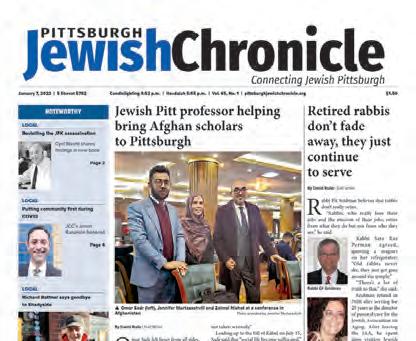

Portraying Murphey, Kohn said, is gratifying “because I play a pivotal part in his life, his career, his success, because I keep him from those limited beliefs that he has about himself. I see this gift in him, and I help him to believe in himself and to trust that he has something really special. It’s really rewarding to be that woman who is behind that success, that kind of man. And it’s rewarding to also see the audience cry and laugh and sing and dance, and it takes them back to maybe a memory that they have listening to ‘Sweet Caroline.’”
Audiences typically arrive at the show “with so much excitement about his music,” Kohn continued. “And so to tell this story that they might not have known before is extremely rewarding. I don’t want to spill too much, because there’s, like, a secret element to the show, as to how we tell his life story. It’s not what you think.”
The show also has some very Jewish moments, Kohn said.
“I think it’s the right amount of humor that the Jews will love,” she said.
Included are scenes where the struggles of Jewish immigrants are captured as well, Kohn said. Diamond’s parents, and all four his grandparents, were immigrants, which may have inspired his song “America.”
Kohn recalled meeting Diamond when he came to one of the company’s performances at

the Pantages Theatre in Los Angeles.
“Honestly, it was a dream come true for me to meet him and to hear his stories and for him to see the show,” she said. “It was very nerve-racking, but also so fulfilling. It was one of our proudest moments in our show to do it in front of him.”
Diamond was “extremely proud the show,” Kohn said, noting he was clapping and singing along with the music. At the end of the show, he sang “Sweet Caroline” along with the audience.

Kohn said she relates to the portrayal of Diamond’s parents as loving and supportive; her parents were like that, too.
“I’m one of five kids, and my parents loved all of us unconditionally, and they helped me to really chase my dreams,” she said. “They believed in me, and they never said no. They never said, ‘I don’t think that this is going to work out.’ They just said, ‘If that’s what you want to do, do it.’ So I’ve always had so much confidence instilled in me since a very young age that I’ve kept with me forever.”
Rather than heading to college after high school, she gave herself three months to see if she could book a show. She did, and has never looked back.
Kohn enjoys touring the country with musicals, she said, “because we are bringing shows to people who normally don’t have access to
Broadway shows. … It is really, really, special.”
“A Beautiful Noise,” she said, will be a unique experience for theatergoers.
“Neil Diamond could have had a biopic, an autobiography, a biography, a mini-series — anything to share his life story — and he chose a musical to share his story. And I think when you see the show, you’ll understand why: It’s because it feels like a real-life concert. It feels like you’re really with him when he was touring, and you feel the electricity of the music, like hitting your soul, hitting your heart. You feel the excitement and it’s spectacular, moving. It’s inspirational and it’s relatable, and it’s for everyone, whether you’re 10 or whether you’re 100. It really is a show for everyone.” PJC
Toby Tabachnick can be reached at ttabachnick@pittsburghjewishchronicle.org.
Every Friday in the and all the time online @pittsburghj e wishchronicle.org. For home del ivery, call 412-687-1000, ext. 2
By Suzan Hauptman | Special to the Chronicle
Akugel is a kind of sweet or savory pudding made of noodles, potatoes or matzah. It is often a symbol of sweetness and unity in the Jewish faith.
I love a good noodle kugel and this one is the very best. I make it every chance I get. I even entered it into a kugel baking competition; it came in second place to another kugel that tasted a lot like mac and cheese — so who can argue with that?
I have been able to adapt this recipe with noodles for Rosh Hashanah or matzah for Passover. Either way, it is incredible.
Traditional kugel (noodle pudding)
Makes 12 servings
Oven Temperature: 350 F
Time: 90 minutes
Ingredients:
1-pound package egg noodles
10 eggs, whites only
¼ cup vegetable oil
5 large apples, peeled and sliced
1 cup sugar
1 can fruit cocktail
1 teaspoon cinnamon
1 12-ounce jar apricot preserves
1 cup raisins

Instructions:
• Spray a large baking pan with cooking spray or coat it lightly with oil (not from ingredient list)
• B oil noodles as directed on package
• Drain noodles and place them in a large mixing bowl
• Whisk the eggs just to combine (they do not need to be frothy)
• Drain the can of fruit cocktail
• Add all other ingredients, except the eggs, and mix together
• Add the eggs and mix well
• Pour mixture into the pan
• Bake covered for 45 minutes and uncovered for 15 minutes or until top is golden brown
Notes:
1. If you want to make the same recipe for Passover, just substitute 10 matzah sheets for the noodles (wet them and dry them before adding to the mixing bowl).
2. You can substitute no yolk noodles or gluten-free noodles if you prefer.

3. You can use any color raisin.
4. If your apples are on the small side, just increase the number by 2 or 3.
5. Most ingredients are to taste, so you can always add more fruit, cinnamon, preserves, etc.
6. This is a very forgiving recipe. PJC
This recipe is included in Suzan Hauptman’s “The Cabin Cookbook: A collection of cozy recipes when you have all day or just a few minutes,” available on Amazon.com. She lives in Pittsburgh.

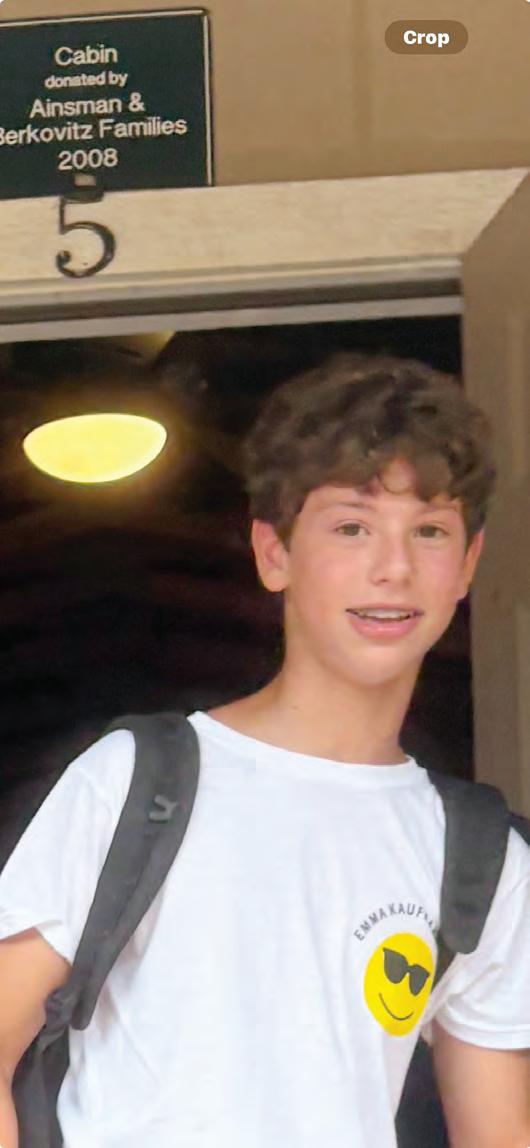
Charles Louis Regan will be called to the Torah as a bar mitzvah at Rodef Shalom Congregation on Sept. 13, 2025. Charlie is a seventh grader at Shady Side Academy. Charlie is the oldest child of Andrea Ehrenreich Regan and Mike Regan. Charlie loves hockey, baseball, robotics, skiing and spending time with his friends and two younger brothers. Charlie also loves his summers at Emma Kaufmann Camp.
Lynne and Steve Weiss, Manalapan, New Jersey, joyfully announce the birth of their granddaughter, Mae Violet Merker. Mae was born on Aug. 26, 2025, and is the daughter of Allie and Harrison Merker of Caldwell, New Jersey. Her other proud grandparents are Cindy and Alan Merker of Wayne, New Jersey. Great-grandparents are Leonard and Carole Rubenstein of Pittsburgh, and Lee Rothenberg and the late Sylvan Rothenberg of Wayne, New Jersey, and Trudy Merker and the late Morris Merker of Glen Rock, New Jersey. Mae Violet is lovingly named for her maternal great-grandmother, Maida (Dolly) Rubenstein and paternal great-grandfather, Victor Weiss. PJC

The mitzvah of bikurim opens Parashas Ki Savo. The Torah commands that when the Jewish people enter the land of Israel and begin cultivating its soil, the first fruits of the shiv’as haminim — the seven species uniquely identified with the land — they must designate the first ripened fruits as an offering to God, given through the Kohanim. These fruits are brought to the Temple in a basket, with great ceremony, and presented to the Kohen. The farmer then recites a passage from the Torah beginning with the words Arami oved avi — translated either as “My ancestor was a wandering Aramean” or “An Aramean sought to destroy my ancestor.” This declaration, which recounts

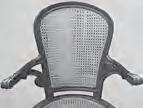


in capsule form the story of the Egyptian exile, slavery and redemption, and the gift of the land, later became the core of the Haggadah on Pesach night, but its original setting was the ritual of bikurim
Although this is the first formal command of bikurim, an earlier story in the Torah takes place specifically during the season of bikurim: The episode of the spies. A common misconception is that bikurim belong only to Shavuos, but Shavuos merely marks the opening of the season with the wheat harvest. In truth, bikurim could be brought throughout the summer as each crop ripened. The Torah notes that the spies set out “in the season of the first ripe grapes.” Our Sages teach that they departed around the end of Sivan and returned on Tish’ah B’Av, 40 days later — exactly in the peak of grape season. Moshe instructed them to bring back fruit, and the Torah records that they returned with an enormous cluster of grapes borne on a pole,

along with pomegranates and dates.
These very fruits reappear in the Mishnah’s description of bikurim:
“When a farmer sees his first date, grape cluster, or pomegranate beginning to ripen, he ties a ribbon around it and designates it for bikurim.”
The Mishnah could have cited any of the seven species, but it deliberately highlights the same fruits carried by the spies. According to Rabbi Menachemn Zemba, his correspondence suggests something deeper: The mitzvah of bikurim serves as a tikkun, a repair, for the sin of the spies.
The meraglim used the fruits of the land to tell a story of fear and despair, illustrating their profound anxieties about their own abilities and God’s promises. Bikurim demands that those same fruits be used to tell a story of gratitude and redemption. The farmer, after a season of backbreaking work in his distant field, carries his first fruits to Jerusalem and declares the national story of Egypt, redemption and inheritance of the land. His personal labor becomes part of God’s great narrative. Like the (perhaps apocryphal ) janitor at NASA who, when asked his job, replied, “I help put men on the moon,” the farmer elevates his work by situating it within a larger mission.
The spies, by contrast, told a destructive story. They looked at the very same fruits and declared: “This land overwhelms us; we
are too small to inhabit it.” That narrative broke a generation and altered Jewish history. Bikurim teaches us to tell a different story — one that ennobles, uplifts and gives meaning to the same fruits, the same reality. The difference lies not in the facts, but in the narrative we choose. This is the tikkun of bikurim: a corrective to the sin of the spies, reminding us that we cannot always choose our circumstances, but we can always choose the story we tell about them.
The spies’ failure lay in choosing the wrong story to tell about the fruits of the land. Bikurim repairs that failure by commanding us to tell the right story — a narrative of faith, gratitude and divine purpose. The stones reinforce this lesson: Israel’s entry into its land must be inscribed, literally and figuratively, with Torah, memory and meaning.
Life confronts us with events beyond our control. But the story we tell about them — the meaning we assign — is in our hands. Will it be the despairing story of the spies, or the redemptive narrative of bikurim? That choice determines not only how we see our lives, but how we write the next chapter of the Jewish story. PJC
Rabbi Daniel Yolkut is the rabbi of Congregation Poale Zedeck. This column is a service of the Vaad Harabonim of Greater Pittsburgh.



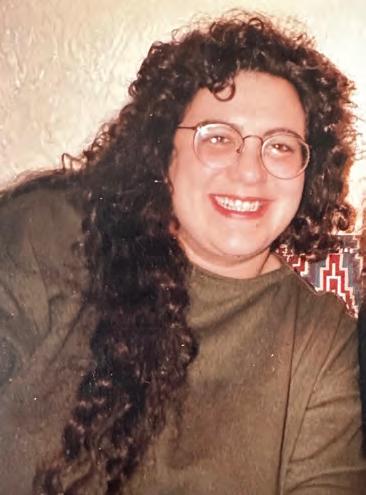
ALLEN: Ruth (Moritz) Allen, 64, died peacefully at her home in Squirrel Hill surrounded by her loving family on the morning of June 21, 2025, following a courageous battle with cancer. Ruth was born in Pittsburgh and raised in Export, Pennsylvania, the first daughter of Silbert and Grace Moritz. As a teen, she worked in her father’s general store, was active in BBYO and sang in the Pittsburgh Youth Chorus. After graduating from Franklin Regional High School, she earned a bachelor’s degree from Boston University. Ruth went on to have a successful career in corporate accounting. She is survived by her husband and partner in crime of 38 years, Jim; her beloved children Benjamin (Jullie), Elizabeth and Jacob; and her cherished granddaughters, Lydia and Evelyn. Ruth touched the lives of many throughout her life. She had an innate ability to connect with people, and often put others at ease just by being herself. She was a supportive and hilarious mother, sister, friend and neighbor. She leaves behind a sprawling community of friends, both lifelong and new. She will be remembered for her generous spirit and her sharp wit. Ruth enjoyed staying up late, visiting the beach in the summertime and keeping up with what was going on in the world. She was a cinephile, an avid reader and a master puzzler. She was active in the Pittsburgh Jewish community and enjoyed attending “mostly musical” Shabbat. She loved her family most of all and was happiest at home surrounded by her children and her cats. Ruth was cared for by Sivitz Hospice, and her family extends a heartfelt thank you to Michelle, Inez, Susan and Mary for their compassionate care and generous time. Her family would like to give special thanks to everyone who attended Ruth’s celebration of life. Donations in Ruth’s honor can be made to the Jewish Association on Aging (Pittsburgh) or Planned Parenthood of Western Pennsylvania.

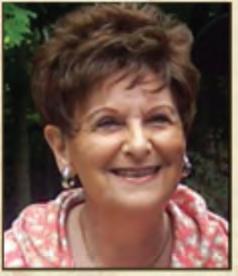
COHEN: Dorene Binstock Cohen, beloved wife of the late Eugene R. (“Huey”) Cohen, passed away peacefully on Sept. 8. Dorene was born in Pittsburgh on May 12,1934, to Israel and Ruth Haston Binstock, owners of I. Binstock Jewelers in Squirrel Hill. She was sister to the late Belle (Meyer) Fogel and the late Louis (LaVerne) Binstock and Rena Binstock. Dorene was cherished by her three children, Jeffrey Cohen, Cathy (Steve) Frank, and Brian (Lori) Cohen. She was the adored Nana of Jason (Miriam) Frank, Hannah Frank, Rebecca (Jonathan) Holder, Jessica (Benjamin) Simon, Amanda (Matthew) Hymansmith, Zephyr (BruceRobert) Salz, Katherine (Gil) Salz Golan, and Aaron (Ankita) Salz. She is the greatgrandmother of Franklin Eugene Holder, Avery Meyer Simon, and Mari and Hazel Hymansmith. Dorene proudly volunteered with many Jewish organizations, serving in programming, fundraising and communications roles. She was a lifetime member of Women’s American ORT, and the motto “Give a man a fish and you feed him for a day; teach a man to fish and you feed him for a lifetime” was often heard in her Beacon Street home. She instilled this love of service in her daughter Cathy, who chaired ORT Pittsburgh’s 50th anniversary, where both she and Dorene enjoyed planning the event and performing in the musical revue. In addition to raising their three children, Dorene and Huey owned Furniture World, a successful furniture store in North Versailles. Dorene was a social butterfly who will be remembered for her giving nature, stylish and vivacious personality, love of life and passion for playing mahjong and canasta with her many friends. She was a backbone




D EBORAH S. P RISE
Licensed Jewish Funeral Director






NEWEST FUNERAL HOME



• Serving the Pittsburgh Jewish Community with Traditional Jewish funerals
• Specially Developed Taharah Room with Mikva facilities for Chevra Kadisha
• Accommodations for Shomer • Guaranteed advanced funeral planning
SERVING Scott Twp., Greentree, Carnegie, Mt. Lebanon, Upper St. Clair and Bethel Park

Larry & Maxine Myer .Lena Myer
The Reisner Family
Mitchell Toig
Joyce Weinstein Levinson .Dr
Contact the Development department at 412-586-2690 or development@jaapgh.org for more information. THIS WEEK’S YAHRZEITS — LOCALLY OWNED and OPERATED 1650 GREENTREE ROAD • PITTSBURGH, PA 15220 412.563.2800 • FAX 412.563.5347

D’Alessandro Funeral Home and Crematory Ltd.
“Always A Higher Standard”

Dustin A. D’Alessandro, Supervisor • Daniel T. D’Alessandro, Funeral Director 4522 Butler St. • Pittsburgh, PA 15201 (412) 682-6500 • www.dalessandroltd.com
Sunday September 14: Isadore Ackerman, Sadye G Adler, Anna Amdur, Milton Saul Baseman, Isadore Cohen, Arnold Deutelbaum, Harold Glick, Joseph Klein, Sylvia Lebenson, William Leibovitz, Isadore Liberman, Pearl Love, Lena Mandelblatt, Lena Morantz, Bessie Wilkoff Osgood, Dora Podolney Krasik, Alick Portnoy, Sarah Rosen, Albert Ross, Morris Schachter, Elsie Skigen, Anne Skirboll, Hyman Stearns, Louis Herman Weiss
Monday September 15: William Beck, Joseph Cohen, Helen Rosen Cowen, Rebecca Eger, Peter Glick, Rose Goldenson, Lucile F Hanauer, Fannie Zweig Lando, Leonora Lichtenstul, Lila P Margolis, Lillian Goldman Mason, Sam Perilman, Maurice Perr, Bessie Geber Rosenfield, Allan Schwartz, Morris Sigman, Jacob Silberman, Bennie Turk, Max Turk, Sally Weintraub Eichner
Tuesday September 16: Julius Altshuler, William V Conn, M .D , Adelyne Crumb, Julius Davis, June Y Enelow, Fay Ruth Frank, Rebecca Green, Stanley Hohenstein, Charles M Horovitz, Sarah Basia Horwitz, Max I Levinson, Mary Ethel Miller, Mark J Mundel, Charles S Perlman, Adolf Siegel, Norman Sife, Sarah B Simon, Herman Wolfe
Wednesday September 17: Bess Abrams, Hanna Balkman, Abraham Bennett, Sara Cukerbaum, Israel Feldman, Eva S Friedman, Max Garfinkel, Selma Halle, Sadie Jacobs, Helen Markowitz, Theodore Miller, Jane Moravitz, Lt Albert Rosenfeld, Albert Sleisenger
Thursday September 18: Leo Morris Americus, Rose Berger, Nathan Drucker, Emma Faigen, Isaac Horn, Paul Kaufman, Emil Joseph Klein, Sarah Levenson, Joseph Mirow, Benjamin Newberg, Abraham Ohringer, Samuel Patkin, Leonard B Rosen, David B Saltsburg, Maurice Stern, Lawrence Norman Tunkle, Gertrude Wanetick, Edmund Wechsler, Ben Weiner
Friday September 19: Bertram B Biggard, Beckie C Cadison, Harold Benjamin Cramer, Harry Doltis, Louis Gordon, Jr , Murray F Hoffman, David Samuel Katz, Louise Mendelson, Emma Mersky, Lena Myer, Roy Ruttenberg, Harry Silberman, Belle Simon, Sylvia F Stern
Saturday September 20: Robert Amper, Ida Bardin, Anna Bernstein, Joseph Morris Fisher, Rose E Litman, Morris Merwitzer, Manuel Howard Neft, Reah Ogun, Rose Orr, Frances Pasekoff, Tybie Poser, Saul Seegman, Abe Sieff, Himie Simon, Abe Siniakin, Lester H Strauss, Freda Weiss









“No day shall erase you om the memory of time.”


Obituaries:
Continued from page 19
of her family, and particularly cherished her relationships with her first cousins, who were like siblings to her. Her family lovingly referred to her as “the bird,” partner to the “the bear,” her husband Huey of 69 years. She will be dearly missed by all. The family would like to extend their deepest gratitude to caregivers Melissa Anderson and Kris Lehman as well as Bethany Hospice, especially Christine Caito, whose excellent care, love and devotion during these past couple of years have been a tremendous source of comfort. Services were held at Ralph Schugar Chapel, Inc. Interment Poale Zedeck Memorial Park Cemetery. Contributions may be made to Alzheimer’s Association (donorservices.alz.org/) or The Women’s American ORT (ortamerica.org/). schugar.com.



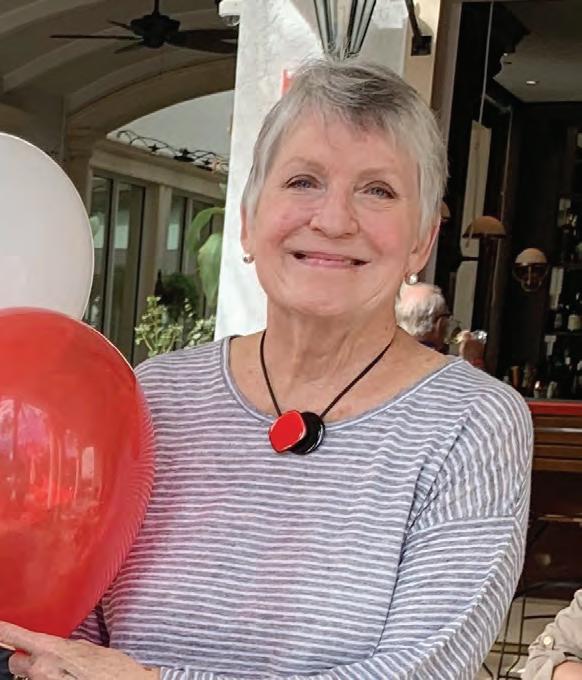
Starters:
Chopped Liver $13.00 (lb)
Homemade Ge lte Fish with Horseradish $7.00 (ea)
Soup:
Matzo Balls (2)
Chicken Noodle
Chicken Rice
Mish Mash – All of the Above $9.25 (qt) Broth
Chicken with
GALANTER: Mary Jane “MJ” Galanter, of Squirrel Hill, passed away on Sept. 2, 2025, at the age of 80. Beloved wife of Robert A. Galanter. Devoted mother of Gregory Galanter (Tammy Miller) and Beth (William) Connolly. Adoring grandmother “GG” to Coleman and Beatrice Connolly. Sister of Barbara (David) Shanks, Debe (Albert) Lomicka, and the late John R. McClung Jr. She is also survived by nieces, nephews and extended family. MJ was born in Rhode Island in 1945 to Virginia (Smith) and John Raymond “Mac” McClung. Mac was a project manager for Dravo, building dams around the country, and the family moved frequently. As a child she lived in Rhode Island, Pennsylvania, Minnesota, Kentucky and West Virginia. After graduating from the University of West Virginia in 1967 she moved to Pittsburgh where she became the first female junior executive at Gimbels Department Store and with two others, opened the Gimbels Monroeville store. Soon after, she became a buyer of coats and tennis wear. MJ was a talented artist, and for many years studied painting in a class at the JCC with many talented friends under the late Lila Hirsch-Brody. As a validation of her talent, she was admitted to the Pittsburgh Society of Artists. She loved to ski, and in earlier years skied with Bobby and the kids at Laurel Valley every winter weekend, and traveled around the country to resorts in the east and west. She started to play golf on her honeymoon and never looked back. She could often be found on the course with her friends or traveling around the country to play with Bobby. Her biggest joys in life were her children and grandchildren. She loved traveling to Michigan to watch Coleman’s hockey games with 2-year-old Beatrice cheering and banging on the glass. She was loved and respected by her friends and adored by her family and she will be missed every day. Services were held at Ralph Schugar Chapel, Inc. Interment Homewood Cemetery. schugar.com

&
Roasted Potatoes • Challa Rolls & Butter * ere Can Be No Substitutions With Dinners
All prices +2.9% credit card fee if applicable
GREEN: Shirley S. Green, on Saturday, Sept. 6, 2025, at the age of 85. Beloved mother of Jeffrey M. Green (Tisha Samuels) and Elise Faith Green. Survived by sisters Judi Snider, Jennifer Lederstein and the late Carol Tulip. Daughter of the late Morris and Jeanne Snider. Funeral services and interment private. If desired, memorial contributions may be made to LHAS- Ladies Hospital Aid Society, 3459 Fifth Ave., Pittsburgh, PA 15213, Jewish Federation of Greater Pittsburgh (jewishpgh.org), or the American Cancer Society (donate.cancer. org ). Arrangements entrusted to Ralph Schugar Chapel, Inc. schugar.com
Jocelyn Lehman, on Friday, Sept. 5, 2025. Beloved mother of Rachel Krasnow (Ed Fine) and Ronna Sue Zell (Jeffrey). Cherished sister of Evelyn Favish, Gerald B. Cohen (Roz), Jack Cohen and the late Marilyn Sindler. Devoted grandmother of Andrew Krasnow (Hannah), Melissa B. Krasnow (Corey Cochran), Stephen Krasnow (Danielle), Aaron Zell (Riya) and Adam Zell (Julia Berenson). Great-grandmother of Harrison Krasnow, Spencer Krasnow, Palmer Krasnow, Camden Krasnow and Effie Cochran. Services and interment were private. Contributions may be made to Congregation Beth Shalom (Andrew and Minnie Cohen Endowment Fund), 5915 Beacon Street, Pittsburgh, PA 15217. Arrangements entrusted to Ralph Schugar Chapel, Inc. schugar.com PJC

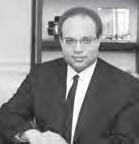





Smith-Rosenthal Team
Jason A. Smith & Caryn Rosenthal Jason: 412-969-2930 | Caryn: 412-389-1695 Jasonasmith@howardhanna.com Carynrosenthal@howardhanna.com


Sherri Mayer, Realtor Squirrel Hill Office C: 412-760-0412 O: 412-421-9121x225 sherrimayer@howardhanna.com HowardHanna.com
of Fifth and Wilkins Spacious 1500-2250 square feet ”Finest in Shadyside” 412-661-4456 www.kaminrealty.kamin.com























































By Penny Schwartz | JTA
Alaugh-out-loud Sukkot story that reimagines the classic tale of the three little pigs; an inspiring work of historical fiction story about a Jewish family in Vienna fleeing Nazi persecution and becoming refugees in Shanghai; and a heartwarming Rosh Hashanah story about two quarreling sisters who promise to be better as the Jewish new year begins.
These are among the titles in the new crop of kids books for the High Holidays that echo the themes of the holidays — a time for celebration and reflection, starting anew and welcoming guests.
Here’s a look at some of the notable reads for kids of all ages.
“My Shofar: A Rosh Hashanah Board Book”
Ann Diament Koffsky
Apples & Honey Press; ages baby-age 2
In this lively story, a playful young elephant with a pink bow tries hard to blow a very loud blast from her shofar, the kid-size version of the ram’s horn blown at synagogues during Rosh Hashanah. Kids will giggle when they discover what’s blocking the sound. Finally, the young elephant can blow a loud tekiah

As fall begins, a young Sephardic girl and her family welcome Rosh Hashanah, the Jewish new year. “Anyada buena, shanah tovah,” she says, using the Ladino holiday greeting. Sarah Aroeste’s rhyming story — animated with Maria Mola’s colorful illustrations — is sprinkled with Ladino words, the centuries-old Sephardic language that Aroeste is one of the leading voices bringing to life today. She helps her father bake a golden brown round challah, among the special foods that grace her family’s Sephardic Rosh Hashanah table.
Saturday, September 13, 2025
11:00 a.m. - 3:00 p.m.
Encompass Health Rehabilitation Hospital of Harmarville 320 Guys Run Road Pittsburgh, PA 15238
Join Encompass Health and To Life! Therapy and Wellness for a Parkinson’s Symposium. Hear from speech therapists, dietitians, physical therapists, nurses, and more about managing Parkinson’s disease.
Lunch is included.

To register, scan or click here or call 412.925.2018
Apples & Honey Press; ages 2-5
In the sixth book in a series about a Jewish girl and her canine sidekick, Kayla and Kugel are tasked with getting supplies for Rosh Hashanah. But hijinks ensue when Kugel jumps into the pond where Kayla and her family will carry out the tashlich ritual and otherwise causes mayhem. In the end, the book demonstrates how Rosh Hashanah offers an opportunity for selfimprovement.
“Lily’s Hong Kong Honey Cake”
Erica Lyons; illustrated by Bonnie Pang Apples & Honey Press; ages 4-8
In Erica Lyons’ inspiring story of historical fiction, kids follow Lily, as her family flees Nazi rule in Vienna, where they own a bakery popular for their Rosh Hashanah honey cake. As Nazi-rule refugees in Shanghai, they open a bakery where they bake honey cake to welcome in a sweet new year. When they are forced to flee again, they must remain temporarily on the ship in the Hong Kong port along with other Jewish refugees. When Rosh Hashanah arrives, the clever Lily and the ship’s chef improvise with what they have and surprise everyone with loaves of the sweet honey cake. Lyons’ narrative is brought to life in Pang’s illustrations that reflect all of the places Lily learns to call home.
“The Three Little Sheep: A Tale for Sukkot”
Ann Diament Koffsky
Green Bean Books; ages 3-8
Jakey, Joey and Jennie are three adorable little sheep who help build their family’s sukkah in this humorous version of the Three Little Pigs. During the seven-day harvest holiday, Jewish families eat their meals in a sukkah — a small, open-roof hut — as a reminder of the dwellings of the ancient Israelites’ desert journey after God freed them from slavery. When the sheep grow too big to fit in their sukkah, mama sheep sends them off to build their own. The two older brothers build sukkahs that the (not-too-scary) wolf blows down. But the youngest sister builds a sturdy one, with room for her brothers. When the wolf shows up, he can’t huff and puff and blow it down. Jennie realizes he’s lonely and invites him to join them, reflecting Sukkot’s theme of welcoming guests.
Kalaniot Books; ages 5-7
In Rabbi Shoshana Nambi’s heartwarming story, Shoshi, whose family is part of the Jewish Ugandan community — the Abayudaya — is a girl-on-the-go, always excited and in a hurry. She loves to help her grandfather, her Jjajja, harvest her family’s special coffee beans and bring them to the market. On Fridays, Shoshi buys food for her family’s Shabbat. “Slow down, Shoshi,” her grandmother cautions before she heads off along with her playful goat. But in her haste at the market, Shoshi forgets the Shabbat candles. With the help of her wise grandmother, Shoshi comes to understand the true meaning of welcoming Shabbat and the joy of being part of the Abayudayah community. Moran Yogev’s collage-style illustrations capture village life and the beautiful East African landscape.
“A Sukkah for Bella”
Jodie Sadowsky; photographs by Frannie Wilson Lovevery publishing; ages 3-8
In Jodie Sadowsky’s story, brought to life in Frannie Wilson’s photographs, kids meet Bella, an endearing girl who loves to build things. This year, Bella — the youngest in her family — is eager to help build her family’s sukkah. Kids will relate when Bella gets frustrated when she can’t do everything the older kids do. But Bella brings her flair to the sukkah by decorating it with colorful, handmade paper chains. At the story’s end, a beaming Bella holds a lulav and etrog, the fronds and fruit that are part of the holiday ritual. This book comes from a popular educational toy company that has expanded into publishing.
“Finding Forgiveness”
Rebecca Gardyn Levington; illustrated by Diana Mayo Farrar, Straus & Giroux; ages 4-8
In Rebecca Gardyn Levington’s touching — and relatable — story channeling the High Holidays spirit, two sisters have an argument on the day before Rosh Hashanah that leaves them both sulking. The next day, at their synagogue, when Jews reflect on the past year and pray for forgiveness, the older sister notices her sister looking sad. She should have been a better listener, she realizes. When her family gathers at the river with the congregation for tashlich – the ritual tossing away of sins — the older one sees her sister still looking sad. She apologizes and the sisters make up with a hug and promise to be better. The book includes suggestions for meaningful apologies that all children can use. PJC
Celebrating strength
Jewish Federation of Greater Pittsburgh hosted “A League of Our Own.” The Sept. 3 event highlighted Jewish women in sports and enabled participants to enjoy Highmark Stadium’s AHN Club.

Stay curious
Students at the JCC Early Childhood Development Center learned about Curious George’s first day of school.
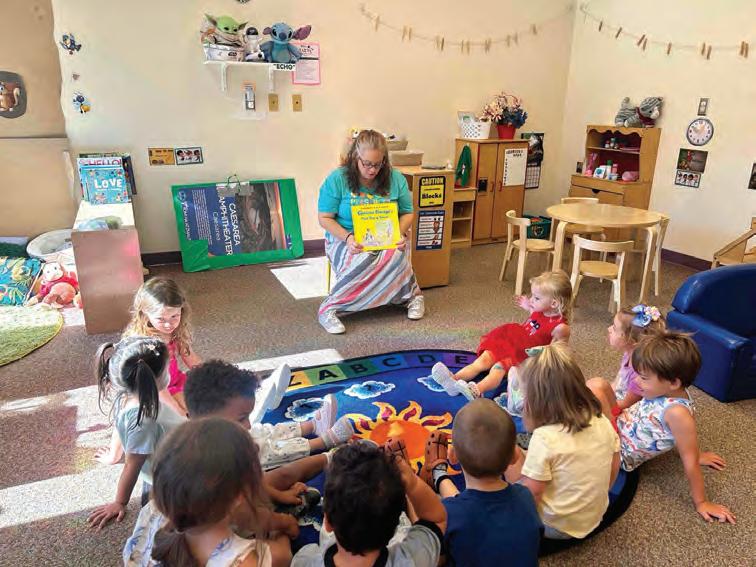
of
Community Center of Greater Pittsburgh Machers and Shakers
House on Campus BBQ

Milo Rent and Hritika Basu, both rising juniors at Pittsburgh Science and Technology Academy, received the Justin Reid Ehrenwerth Emerging Scholar Award. The $15,000 prize, funded through the Jewish Healthcare Foundation, is administered by JHF and the University of Pittsburgh School of Public Health and is part of the larger Justin Reid Ehrenwerth Community Impact Award initiative, which supports community-based projects aligned with Ehrenw erth’s lifelong commitment to equity, sustainability and public service.
